So many books this month, and this time, we've got all superlatives. Check out the second June Galactoscope!
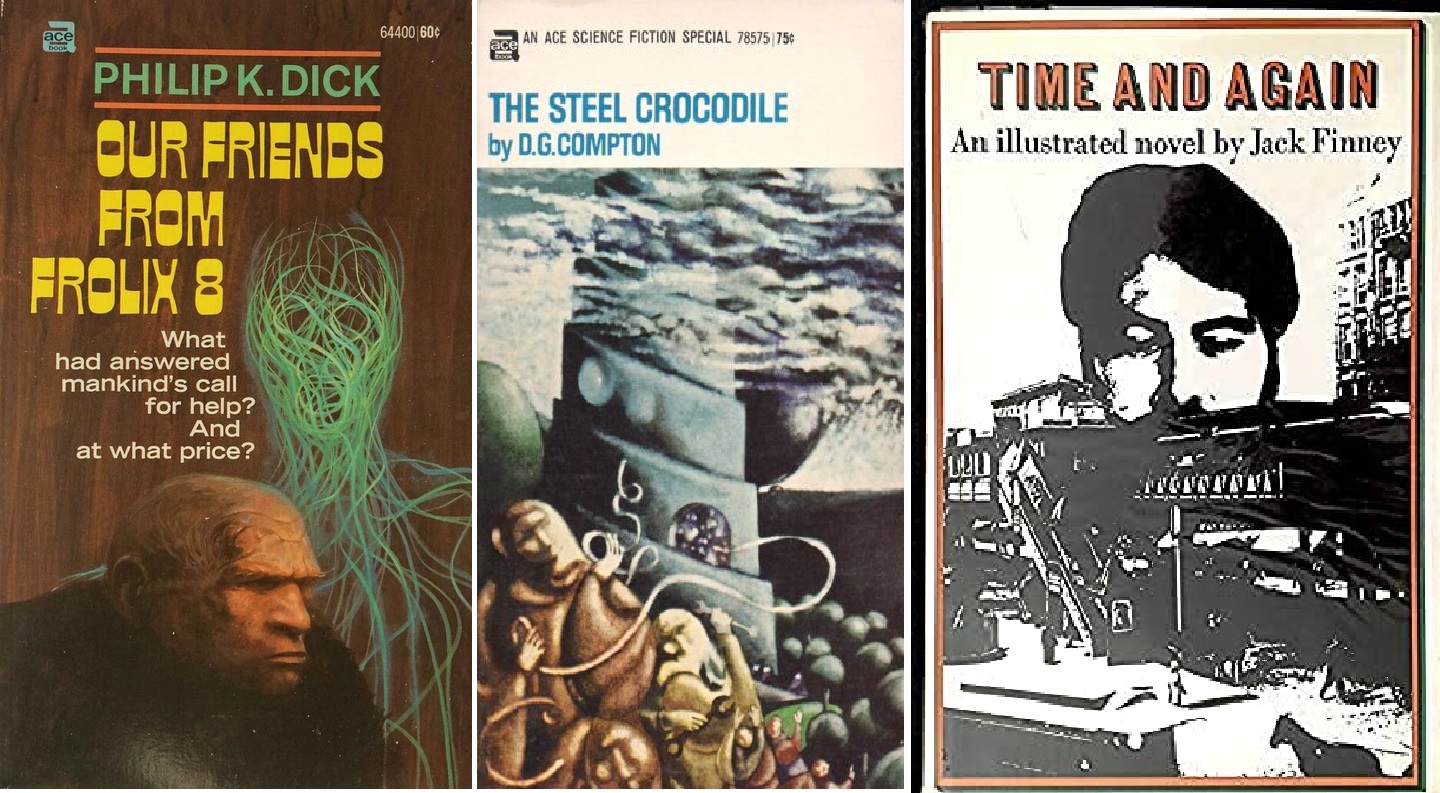
Continue reading [June 17, 1970] Time and Again (June Galactoscope Part Two!)
So many books this month, and this time, we've got all superlatives. Check out the second June Galactoscope!

Continue reading [June 17, 1970] Time and Again (June Galactoscope Part Two!)
Science Fiction Theater Episode #10
Tonight (Oct. 31), tune in at 7pm (Pacific) for our special, Halloween-themed episode!

by Gideon Marcus
Inside Lebanon
Feel that? It's the calm before the storm.
For the past week, the nation of Lebanon has been rocked from within by "Palestinian" guerrillas. Yesterday, at the behest of leaders in Cairo, Damascus, and Tripoli, the raiders settled down, awaiting what looks like will be a significant negotiation between Arab power brokers.
I'm no expert on the issue, but here's what I've gleaned. When Israel declared independence in 1948, a significant percentage of the Arab population within the nascent nation's borders left the former mandate of Palestine. Some fled violence, like that inflicted by classy folk such as Menachem Begin of the Irgun, a Jewish terrorist group. Others left at the exhortation of their Arab brethren, who proclaimed that they were about to drive the Jews into the sea.
Hundreds of thousands of Arabs ended up in neighboring countries: Jordan, Egypt, Syria, and Lebanon. Indeed, exiled Arabs now comprise 12% of the population of Lebanon—fully 300,000 people. They live in camps administrated by the draconian Lebanese Deuxième Bureau.

The "Palestinian Liberation Organization", founded in 1964 with the goal of "the liberation of Palestine", initiated terrorist attacks against Israel after The Six Day War in 1967. Such are being carried out from enclaves in other countries with more or less tacit permission from those countries' governments.
The recent irruption in Lebanon arose from the Lebanese cracking down on these raids. The violence, thwarted from heading southward, flooded internally—into Beirut, Tyre, Lebanese Tripoli, and other major cities. Egypt, Syria, and Libya all leaned hard on the Christian Arab nation to let loose the reins on the guerrillas. Lebanon has relented, and the negotiations will proceed shortly. Participants will be Dr. Hassan Sabri El Kholi, personal envoy of Egyptian President Gamal Abdel Nasser, Libyan Interior Minister Mousa Ahmed, and guerrilla chief Yasser Arafat. While there's no telling what the outcome will be, one has to imagine the Palestinians will be allowed to resume their raids into Israel again.
With the War of Attrition occupying Israel on its western and eastern fronts, it now looks as if the Jewish state is about to be busy defending from the north, too. Most folk are betting on the Israeli Defense Force, but can the country survive under siege forever?
Time will tell.
Inside Analog

by Vincent Di Fate
Like Lebanon, the crisis facing Analog comes from within, as evidenced by the latest issue. From without, the magazine looks like it always has—handsome, professional. But within, one can see the rot. Not that it's all bad; indeed, much of it is decent. But what works is stagnant, and what doesn't work is very much the sort of thing we expect from long-toothed editor John Campbell.
Gottlos, by Colin Kapp
Starting off, we have what looks like a Bolo story—one of those Keith Laumer tales featuring a sentient, super-tank. Unlike Laumer's stories, this one has a lot of action, with the Fiendish mauling dozens of opposing vehicles, overruning a command post, and then meeting its match with the arrival of the ebony Gottlos.
After Fiendish is destroyed, we learn that it was actually a remotely controlled tank. Its pilot, Manton, had so thoroughly melded with the machine, that the result was a gestalt personality, one motivated by violence and vengeance. With his vehicle destroyed, Manton falls into an apparent funk, shaken by the appearance of a more powerful machine. The real terror of Gottlos is that it seems to need no radio controls at all. Is it autonomous? A kind of cybernetic beast?
Kapp has written more of a philosophical than predictive piece, describing how a society might decay under the strain of endless war and complete mechanization. I appreciate Kapp's skill with English, but the story itself seemed a bit implausible in its setup.
Three stars.
Telepathy – Did It Happen?, by J. B. Reswick and L. Vodonik

Oh boy. A pair of cranks conducted a telepathy experiment. Here's the notion: telepathy is only reliable about 1-2% of the time. But what's really happening, they suppose, is that there's just so much interference that the message gets clogged with static. If one conducts thousands of tests using a simple message, the errors will be reduced, and the message will stand out.
The setup they used involved a binary message and transmitter. After many trials, the experimenters determined that had gotten the error down low enough to show that something had objectively been transmitted. Of course, the researchers admitted that their data only supported this conclusion if you read the results backwards (i.e. if the 1s of the original message were logged as 0s and vice versa.)
Given the thin margins of success, if you gotta flip the results on their heads to get any kind of answer, I suspect it's all bogus. Which is how I'm beginning to feel about psionics in general.
One star.
Weapon of the Ages, by W. Macfarlane
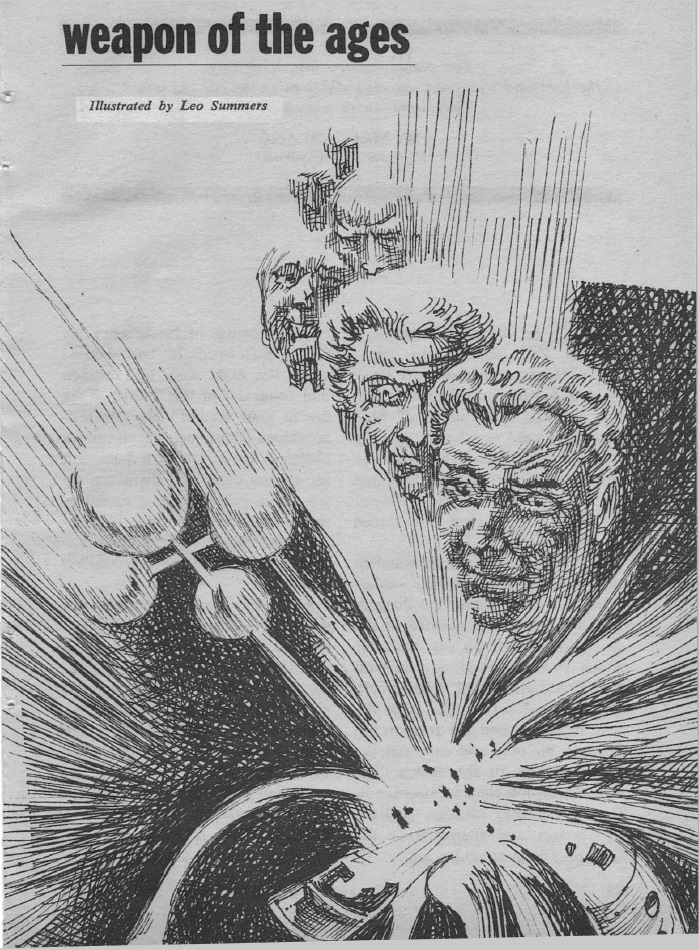
by Leo Summers
Humanity is hounded by vicious extraterrestrials when they try to go to the stars. One pilot crashlands on a neutral world, is conducted to a mysterious weapon, and manages to wipe out a set of local marauders. The weapon's use has side effects, one which the owner's race is prepared for, but not the human who fired it.
Macfarlane is trying for a cute sting-in-the-tail story, but the whole thing is nonsensical, so it lacks the desired impact.
Two stars.
The Ambassadors, by as by J. B. Clarke
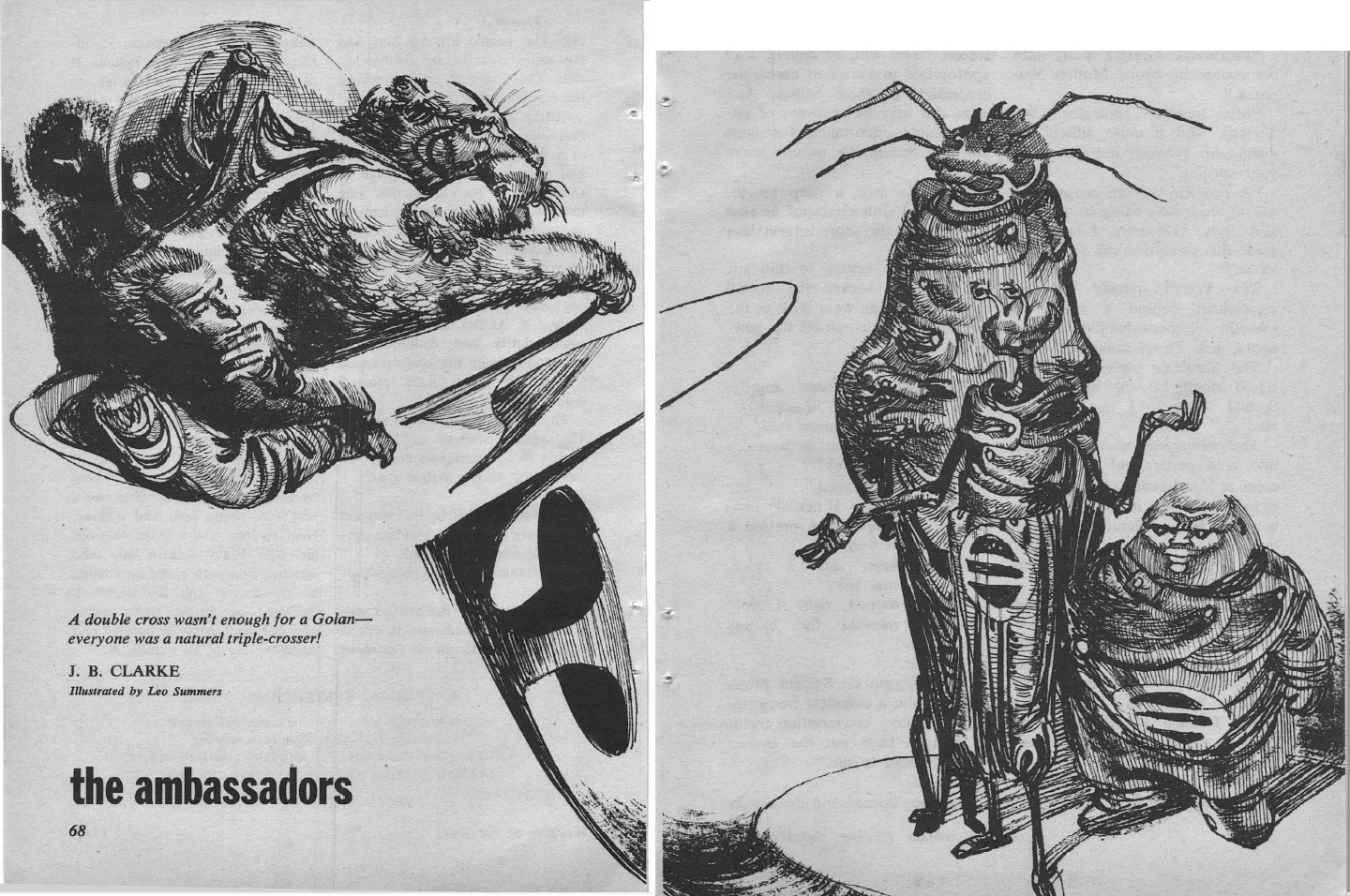
by Leo Summers
A set of three disparate aliens makes contact with the galactic organization of which the humans are a member. Said aliens claim to be vastly superior to our federation, but they say they'll be generous and give us a few technological wonders—if only we'll give them an example of one of our best starships, so they can gauge our level of progress. Since homo sapiens has (per the story) an unique ability to sniff out a scam, a human is sent to investigate to see if the aliens are on the level.
Things that suggest the aliens are hoaxing: they showed up in a borrowed spaceship, no one has ever heard of their stellar confederation, and their "capital" planet is a smoggy wasteland. Points in their favor: the three wear a common uniform and despite profound apparent racial differences, work together in perfect harmony. Conclusion, they must represent an ancient and tight-knit federation!
Much is made of the fact that most species in the galaxy are bi-sexual. Not that you'd know from this story, whose only female human is a "pert secretary." The leader of the alien delegation is a female, to the surprise of the humans receiving them. Cue the snide comments about how women always have to speak for the menfolk (the implication being that such arrogance is misplaced). In the end, the gender of the aliens is the key to unpuzzling the obvious hoax.
Clarke spends a lot of time setting up a puzzle whose solution is apparent from nearly the beginning. The characters have to be obtuse to make the story work. Obtuse and sexist.
One star.
Shapes to Come, by Edward Wellen

by Vincent Di Fate
A scientist in an isolated base on the Moon has completed his work: he has perfected a spore that will inject itself into any alien genetic structure, instilling an irresistible trust of the human form. By seeding the stars with this spore, when we meet any extraterrestrials, they will necessarily greet us with love and affection.
But before the spore can be deployed, an alien armada shows up. Can you guess what completely unexpected result ends the tale based on the story's setup?
This is comic book level stuff. Two stars.
The Yngling (Part 2 of 2), by John Dalmas

by Kelly Freas
Concluding the two-part serial begun last ish, The Yngling latter half is choppy but worthy.
When we last left our hero, the psi-adept Nordic warrior, Nils Ironhand, he had been sent into the lion's den. More specifically, to the domain of Kazi, an immortal (through soul transferrence into new bodies) who reigns through unbelievable cruelty. His armies are poised at the doorstep of Europe, and in short order, more than thirty thousand of his "orc" hordes will sweep through the Balkans bent on rapine and ravagery.
Nils presents a condundrum to the psionic tyrant as his signature trait is the lack of an internal monologue. Thus, his mind cannot be read, barely even sensed. He also is completely without guile. Interestingly, while this wordless mentality is portrayed as an unique characteristic, and perhaps a side effect of Nils' psi powers, it can't be that rare in the real world. Indeed, one of the Journey's very own, Tam Phan, possesses this trait. Now, Tam is also a fantastic warrior, so there may be a connection.

Tam and familiar faces at a local gathering of Vikings
In any event, after Nils gets to witness some particularly gruesome examples of Kazi's barbarism, he escapse, makes it back to Hungary, and organizes a resistance comprising Magyar, Ukrainian, Polish, and Bohemian knights…as well as hundreds of his kinsman, who have just crossed the Baltic, fleeing the impending Ice Age. The resulting battle is lengthy, desperate, and strategic in detail. Of course, you can guess who wins.
This is a tough book to rate! It's firmly in the genre of magical post-Apocalypse, along with Omha Abides, Spawn of the Death Machine, Out of the Mouth of the Dragon, and so on. I happen to like this genre, and while I'm growing to loathe psi stories, in these settings, I can just pretend it's a kind of magic, or maybe lost technology.
The key to writing this genre well, and Dilmas does, is to bathe it in sensuality and adventure. In many ways, Nils is more akin to Conan than any scientifical hero you'd expect to find in Analog. I also greatly appreciate that Dilmas manages to convey the most unspeakable of tortures completely obliquely. A few artful words can chill far more than pages of explicit gore.
Too, I enjoyed the grand depiction of the battle, complete with fog of war and the uncertainty that accompanies it. So vivid is this portion of the novel, that one could probably adapt a cracking wargame from it. Jim Dunnigan, are you listening?
It's not all roses, of course. As in the first half, the various sections of the novel don't quite hang together well, like bricks without mortar. Much is bridged in shorthand. Also, Nils having to retell the same story to half a dozen European lords to rally them against the orcs was a bit tiresome. Perhaps all of these things will be smoothed when this story inevitably gets picked up by Ace. Or maybe not—they like their books short.
Anyway, I'd give this installment four stars, three-and-a-half for the whole. Fans of this sort of thing, like my nephew, David, may notch up their assessments a touch.
Doing the math

Boy, Analog has been bad lately. I know it seems like I just keep saying it over and over again, but until these doldrums end, I'll have to find creative ways to repeat myself.
At 2.3 stars, Analog is by far the lowest in the pack. IF got 3.1; Vision of Tomorrow got 3.2; even Amazing got 3.2; Galaxy got 2.9; so did Venture; Fantasy and Science Fiction got 2.7; and New Worlds got 2.8.
Women wrote about 10% of what was published this month, and you could fit all the four and five star stuff in two digests. Given that eight came out for November, that's a pretty weak showing.
Perhaps if Ted White, Ed Ferman, Charles Platt, and Ejler Jakobsson went over to Condé Nast headquarters for a negotiation, Campbell might loosen the reins on his writers. Couldn't hurt!

by Yo Aoyama
It's been a while! This is Yo Aoyama with an article from hot Japan, where we are still experiencing a truly Endless Summer.
This may seem a bit out of the blue, but have you heard of tanka? Tanka is a traditional Japanese form of poetry first committed to writing in the Manyoshu collection of the Nara period. This 1200 year form uses a fixed 31-syllable (mora) format of 5-7-5-7-7.
I started making my own tanka a few years ago while composing lyrics and music, and it's something I study to this day. Nevetherless, I am still no expert, so please forgive me if my analysis is not 100% accurate. And bear with me—while the connection to science fiction and fantasy may not be immediately obvious, there is a revolution underway in the form that suggests a more fantastic future may be arriving soon…
In the modern era, tanka has focused on realism and been dominated by compositions about everyday life. Up to the 1950s, Tanka poems universally had a strong personal quality. That is, they have been considered as first-person literature, and the author has been considered as the main character in the poem, and the contents of the poems have often been based on reality. But since the 1950s, an "avant-garde Tanka movement" has emerged that seeks new forms of expression. Avant-garde Tanka is characterized by the use of symbols and metaphors, as well as the use of fiction. This has opened up the possibilities of Tanka poems.
The exciting potential of the new tanka can readily be seen in the following three recent works (rendered in Japanese first to demonstrate the rhythm, then translated into English).
1. 革命歌作詞家に凭りかかられてすこしづつ液化してゆくピアノ(塚本邦雄『水葬物語』,1951)
Kakumei ka sakushi-ka ni yorikakararete sukoshi dzutsu ekika shite yuku piano.
A piano that gradually liquefies, leaned upon by a revolutionary songwriter
Kunio Tsukamoto is representative of avant-garde tanka. The image of the liquefying piano is reminiscent of surrealist works such as Dali's "The Persistence of Memory". A revolutionary songwriter can be said to be someone who uses music as a political tool rather than as art. The sight of the piano liquefying under the influence of the songwriter can be thought of as representing the danger of art being absorbed into the political or practical world. Perhaps he had in mind the fact that the art form of tanka itself was in danger of disappearing due to its association with the nation and the Emperor System during World War II.

Kunio Tsukamoto, 1951
"Water Burial Story" is the opening poem of his first collection of tanka poems, Water Burial Story, and can be considered one of his masterpieces. His latest collection of tanka poems, "Kangenraku," was released on September 9 this year, and is also attracting attention.

Water Burial Story, by Kunio Tsukamoto, 1951
2. 晩夏光おとろへし夕 酢は立てり一本の瓶の中にて(葛原妙子『葡萄木立』,1963)
Bankakou o toro e shi yū; su wa tateri ip-pon no bin no naka nite
Late summer light fades in the evening; vinegar stands up in a single bottle
This next work, by Taeko Kuzuhara, caused Kunio Tsukamoto to dub her the "Queen of Visions." This is a poem (from the collection Budoukidachi) with a rather unique rhyme scheme and no third line. It is a casual poem about an evening in late summer when the strong sunlight has weakened, and vinegar stands up in a bottle, but readers will find it strange that she says that the vinegar stands up instead of saying that the bottle of vinegar stands up. Combined with the absence of a third line, a tranquil yet dignified atmosphere flows throughout the poem.
In this way, Kuzuhara's poems reinterpret reality by injecting a touch of fantasy into daily life.

Taeko Kuzuhara

Budoukidachi, by Taeko Kuzuhara, 1963
3. かくれんぼの鬼とかれざるまま老いて誰をさがしにくる村祭(寺山修司『田園に死す』,1965)
Kakurenbo no oni tokarezaru mama oite dare o sagashi ni kuru mura-sai
The village festival where the hide-and-seek demon, grown old, has come looking for someone
This last tanka is from the latest collection of poems, Dies in the Countryside, by Shuji Terayama, who is active in a wide range of fields, including as a poet, playwright, and scriptwriter. What distinguishes this tanka is the oblique subject. Who is the "someone" who will be the victim of the aged demon? Why is it there? The creepiness, like the plot of a horror movie, is amplified by the lack of a subject, which obscures the faces of the characters, and the magical atmosphere of the village festival, which has been fixed in reality.

Dies in the Countryside, by Shuji Terayama, 1965
Terayama is skilled at creating fiction, and his skills are fully demonstrated in his tanka. The anthology "Die in the Countryside," from which this poem is taken, has some autobiographical aspects, but also includes songs about a fictitious younger brother and his late mother (Terayama's actual mother is still alive), and shows a deliberate attempt to exclude or shift the personal.

Shuji Terayama
What did you think? Poets continue to write poems that attempt to capture profound thoughts, unforgettable scenes, and compelling stories in the very short 31-syllable form of poetry. Thanks to the modern revolutionaries, tanka is now open to infinite possibilities. Perhaps in the future we will see the birth of science fiction and fantasy tanka with even more narrative qualities. The ever-evolving trends of tanka will be something to keep an eye on—especially for those on this Galactic Journey!

by Gideon Marcus
Murder in Hollywoodland
Senseless mass death is no stranger to the headlines these days. We've had the Boston Strangler. The Texas sniper. The Chicago nurse murderer. But this last week, southern California got a shocking introduction into this club.
At least seven were killed on the nights of the 8th/9th and then the 9th/10th, including Valley of the Dolls actress, Sharon Tate (pregnant with her first child), in two Los Angeles neighborhoods: ritzy Beverly Crest and SilverLake. At first, the scenes were so grisly and bizarre that police suspected some kind or ritual. Jay Sebring, the famous hairstylist who gave Dr. McCoy his "brainy" JFK-style hair-do, and Tate were found stabbed, tied up and hanging on alternate sides of the same rafter, both wearing black hoods. Market owners Leon and Rosemary La Bianca, the SilverLake victims murdered on the second night, were similarly hooded, the latter with red X marks carved into her body.

Wheeling Sharon Tate from her home
Homicide squads are currently swarming the San Gabriel Valley, and while Inspector Harold Yarnell and medical examiner Thomas Noguchi had no insights to offer when they appeared before NBC's cameras on the 10th, police do see connections. "Pig" was scrawled on the door of the Tate home, while "Death to Pigs" was found on the home of the La Biancas, formerly the residence of Walt Disney. Police have not indicated whether they believe the homicides were done by the same person or persons, or if a copycat was inspired by the first murders.
It's shocking, senseless, and tragic. While the murders took place in upper class homes (one of the deceased was heir to the Folger coffee fortune), the motive appears not to have been robbery. Just angry, hateful death. It's not a happy time in the Southland right now.
Death in New York
While not of the same magnitude, at least in terms of human misery, nevertheless the latest issue of Galaxy science fiction is so bad, that one wonders if someone is trying to put the institution down.

by Donald H. Menzel
Humans, Go Home!, by A. E. van Vogt
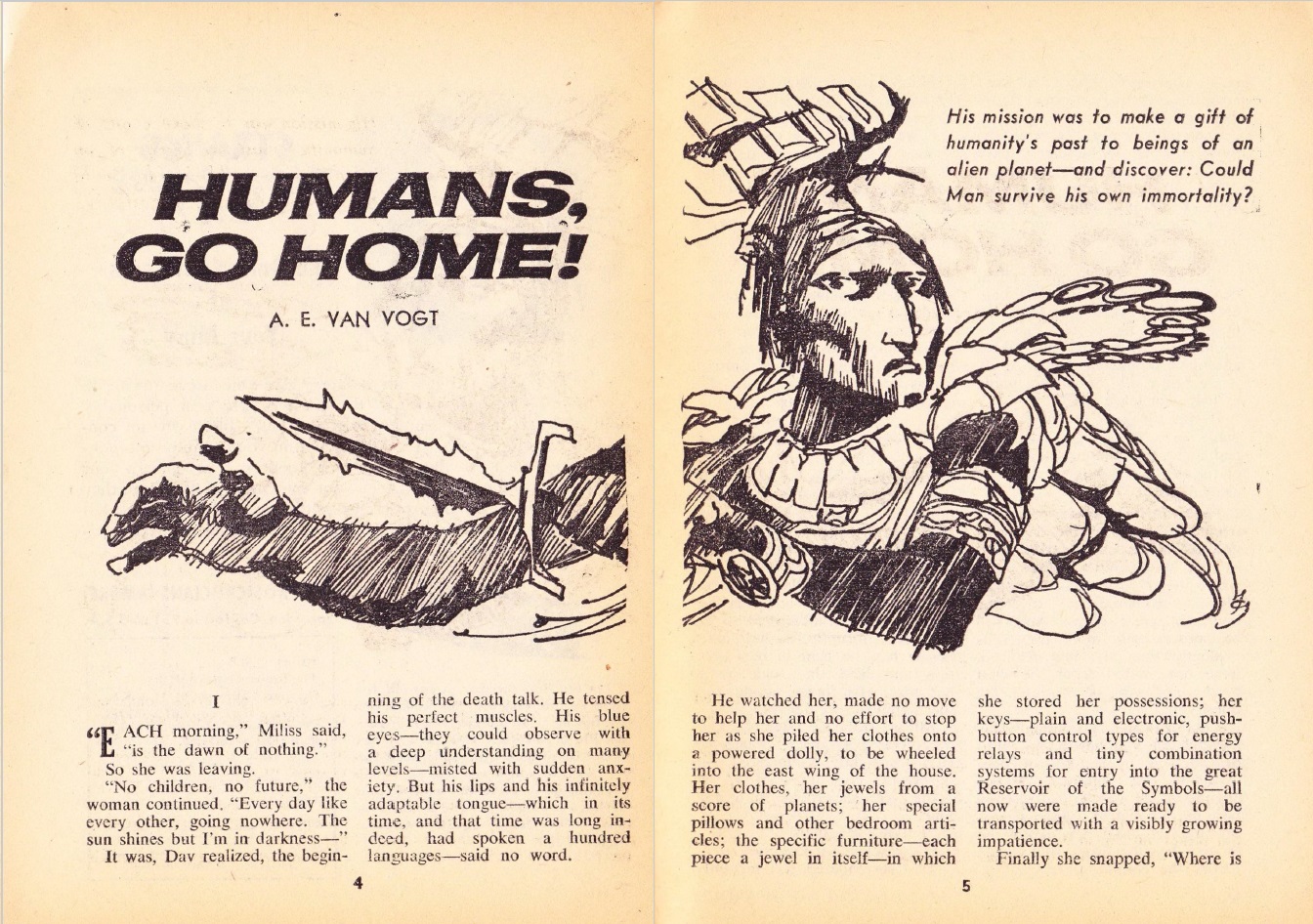
by Jack Gaughan
A married human couple, immortal but catching the death-wish that has killed most of humanity, has lived on the world of Jana for 400 years. They have used that time to accelerate the development of the humanoid species there, urging 4000 years of technological advance in that time—in part through the use of Symbols, abstract concepts made real by the power of belief. The Janans have their own problems: the women don't like procreation or children, and the men must rape them to propagate the species.
Eventually, the humans are put on trial for their efforts, and (I'm told) we learn there is a lot more to the setup than meets the eye, and that everything the characters believe is actually some kind of falsehood.
I found this first piece impenetrable, giving up about halfway through. Thankfully, a friend of mine, who is fonder of Van Vogt, gave the piece a write up in his 'zine. That's good, as I was dreading having to slog through this one and analyze it, as if it were a book report for a hated school-assigned novel. At 50 years old, I'm allowed to pick my poison.
One star.
Martians and Venusians, by Donald H. Menzel

by Donald H. Menzel
Professor of Astronomy and Planetary Sciences at Harvard offers up his clairvoyant images of Martian wildlife, complete with pictures (q.v. the cover). I wonder if Dr. Menzel has an eight-year old child who really wanted to get published, as well as some blackmail leverage on Galaxy editor Jakobssen, because I can't see any other way this peurile, pointless piece ever saw print.
One star.
Out of Phase, by Joe Haldeman

Braaxn the G'drellian is the adolescent member of an alien anthropological team. He was selected to infiltrate the humans for his shape-changing abilities; unfortunately, the youth also has a racial fetish for the infliction and appreciation of pain—common to all of his kind at that age.
Can he be stopped before he unleashes a terror that will exterminate the entire human race?
An unpleasant, but competently written story. Haldeman is new, so of course, there's a "clever" twist to finish things off.
Three stars
The Martian Surface, by Wade Wellman
Wellman's wishful thinking in poetry is that, despite the obvious hostility of the Martian surface, life could still somehow cling to it. Written to coincide with the arrival of the new Mariners, it is no more or less accurate for their flyby.
Three stars.
Passerby, by Larry Niven

by Jack Gaughan
A ramscoop pilot stumbles upon a professional people-watcher in a park. The "rammer" has a story to tell, a tale of being lost among the stars, and of the titanic alien he encounters in the blackness of space.
This is one of Niven's few stories not set in "Known Space", and it's a simple one. That said, it reads well, particularly out loud, and there is the usual, deft detail that Niven imparts with just a few, well-chosen words.
Janice liked it, but thought it rather shallow. Lorelei, on the other hand, loved that it had a philosophical message beyond the good storytelling.
So, four stars, and easily the best piece of the issue (not much competition…)
Citadel, by John Fortey

by Jack Gaughan
Aliens descend on Earth, erecting mysterious edifices and offering the secrets of the universe. Twenty years later, most of humanity is under their thrall; those who enroll for alien "classes" invariably leave society and end up part of the worldwide hive mind. One organization has a plan to infiltrate the extraterrestrials, to at least find out what's going on, if not stop them.
But can they handle the truth?
Answer: probably, especially if they've seen The Twilight Zone.
Nice setup, but a really novice tale.
Two stars.
Revival Meeting, by Dannie Plachta

by M. Gilbert
A "corpsicle" wakes up after a century, but instead of finding a cure for his disease, he finds he's been roused for a more sinister purpose.
This story doesn't make much sense, and it's also about the bare minimum one can do with the concept of frozen people (again, Niven's covered these bases pretty thoroughly with The Jigsaw Man and A Gift from Earth.
Two stars.
For Your Information (Galaxy, September 1969), by Willy Ley

For reasons that will shortly become apparent, it's a real pity that this non-fiction column is not one of Ley's best. It's a scattershot on rocket fuel (well, the oxidizer one combines with the rocket fuel to make it burn), modern pictographic writing, and the latest crop of satellites.
It's just sort of limp and dry, a far cry from the scintillating stuff that helped make early '50s Galaxy such a draw.
Three stars.
Dune Messiah (Part 3 of 5), by Frank Herbert

by Jack Gaughan
It is astonishing how little Frank Herbert can pack into 50 pages. In this installment, Paul Atreides, Emperor, is trying to make sense of a recurring vision, that of a moon falling (his precognition having been hampered by the presence of a clairvoyant "steersman"—the spice-addicted navigators of the space lanes).
He visits the Reverend Mother of the Bene Gesserit, whom he has locked up in prison, to let her know that his consort, the Fremen Chani, is finally pregnant (despite Paul's wife, Irulan, furtively feeding her contraceptives for years). But Paul also knows that the birth of the heir will mean Chani's death.
Then Paul heads out to the house of a desert Fremen, father of the girl who had been found dead by Alia last installment. The Emperor heads out there at the girl's invitation—she's not actually alive, but rather, her form has been taken by a shapeshifting assassin.
At the home, Paul meets a dwarf who warns him of impending danger. Whereupon, an atomic bomb explodes overhead.
Along with the endless viewpoint changes and the nonstop italicized thought fragments, we also have more of the innovation Herbert came up with for this book: repetition of dialogue through slightly different permutation. Seriously, the whole story so far could have been a novelette, and we're almost done!
Anyway, I didn't hate Dune, but I felt it was overrated. This sequel, however, is just wretched.
One star.
Credo: Willy Ley: The First Citizen of the Moon (obituary), by Lester del Rey

by Jack Gaughan
And now the real tragedy—Willy Ley is dead. He was only 62.
I knew that he was a science writer who fled Nazi Germany. I did not know how integral he was to the field of rocket science. A key member of the German rocketry club, he was a mentor to Wehrner von Braun. The key difference between the two is Ley immigrated to the U.S.A. rather than serve Der Fuhrer. Von Braun did not.
Ley went on, of course, to be one of the most esteemed science writers—up there with Asimov, at least in his main fields, zoology and rocketry. He died less than a month before Armstrong and Aldrin stepped on the Moon. Denied the Holy Land, indeed.
I have no idea whether there are more Ley articles in the pipeline. There was supposed to be a new, twelve-part series, but who knows if it was ever completed or submitted.
Sad news indeed. Four stars.
Autopsy report
Galaxy hasn't topped three stars since the June hiatus accompanying editor Pohl's departure/sacking, but this is, by far, the worst issue of the magazine in a long time. Was Pohl fired for his declining discernment? Or did he accept a bunch of substandard stuff as a flip of the bird to the new ownership?
Whatever the answer, I certainly hope things improve soon. Without Ley, without quality stories, Galaxy is heading for the skids, but quick.

by Gideon Marcus
Huzzah!
It's hard to believe it was just six years ago that the Renaissance Pleasure Faire started in the suburbs of Los Angeles:


"Counterculture" didn't even have a name yet (I think we were calling it "contraculture"), but already, there were folks weary of the modern age, casting their eyes back to a simpler time. You know, when there were far more things that could kill you, and much fewer opportunities to escape drudgery…
Anyway, I reported on our last foray into the past a couple of years ago. These days, the back-to-then movement is stronger than ever, with the Society for Creative Anachronism exploding (do they have a thousand members now?) and Renaissance Faires catching on. They are a good fit for the Pagans and hippies and folks looking for an escape.
We're not immune to the lure. Here are some scenes from this month's event:












You may recognize the fellow in blue
What really makes the Faire such a delight is the attention to detail. Everywhere you go, there are actors and actress really playing a part, making the whole thing an exercise in living history. Of course, as my "character" styles himself a member of the Habsburg clan, you can bet I razzed the Queen when she paraded by with her foppish retinue.
Nevertheless, I hope the Faire retains its purity, prioritizing the spirit of the event rather than descending into a kind of cynical capitalism. Though, I suppose, that's what the original faires were all about…
Alas!
Speaking of cynical capitalism, I feel that Analog editor stays on the job these days just for a paycheck (and a podium for his irrascible editorials—which he then compiles and sells in book form!) While the latest issue isn't terrible, it certainly doesn't scrape the heights it achieved "back in the day."

by Leo Summers
Artifact, by J. B. Clarke
The name of J. B. Clarke is unknown to me. Perhaps he's Arthur Clarke's little brother (sister?) His writing isn't bad, nor even is the premise, but the execution of this first tale of his…

by Leo Summers
A beach ball-sized orb appears in interplanetary space. When an Earth spaceship tries to pick it up, it zips away at faster-than-light speeds a couple of times, as if to demonstrate that it can, and then becomes docile. After it is picked up, the humans assessing the artifact determine that it was deliberately sent to jump-start our technology. But was the rationale benevolent or otherwise?
This would have been a great story had not Clarke explained from the very beginning that the scheme was a plot by the evil Imperium to instigate a diplomatic incident a la the Nazis asserting a Polish attack against the Germans on September 1, 1939. This would give the rapacious aliens legal precedent to annex our planet. Moreover, we learn that an agent of the "Web", the galactic federation of which the Imperium constitutes a small portion, is already on Earth, guiding our assessment of the artifact.
As a result, there's no tension. We know everything will turn out fine. Indeed, it's a strangely un-Campbellian story in that humans aren't the smart ones in the end. But because there are no decisions to be made, no suspense to the outcome, the story falls flat.
Two stars.
Zozzl, by Jackson Burrows

by Leo Summers
This one gets closer to the mark. It stars a big game hunter whose quarry is a telepathic beast. The creature's natural defense is to access your fears and throw pursuers into a nightmare world, repelling them. It's a neat concept, and Burrows (another name with which I am unacquainted), renders the dream sequences quite effectively.
While we learn a bit about our hero's past and motivations, he never really has to solve any puzzles to win his prize. He just wins in the end. There needs to be more.
Still, I really dug the idea, and there's definitely potential for Jackson. Three stars.
Dramatic Mission, by Anne McCaffrey
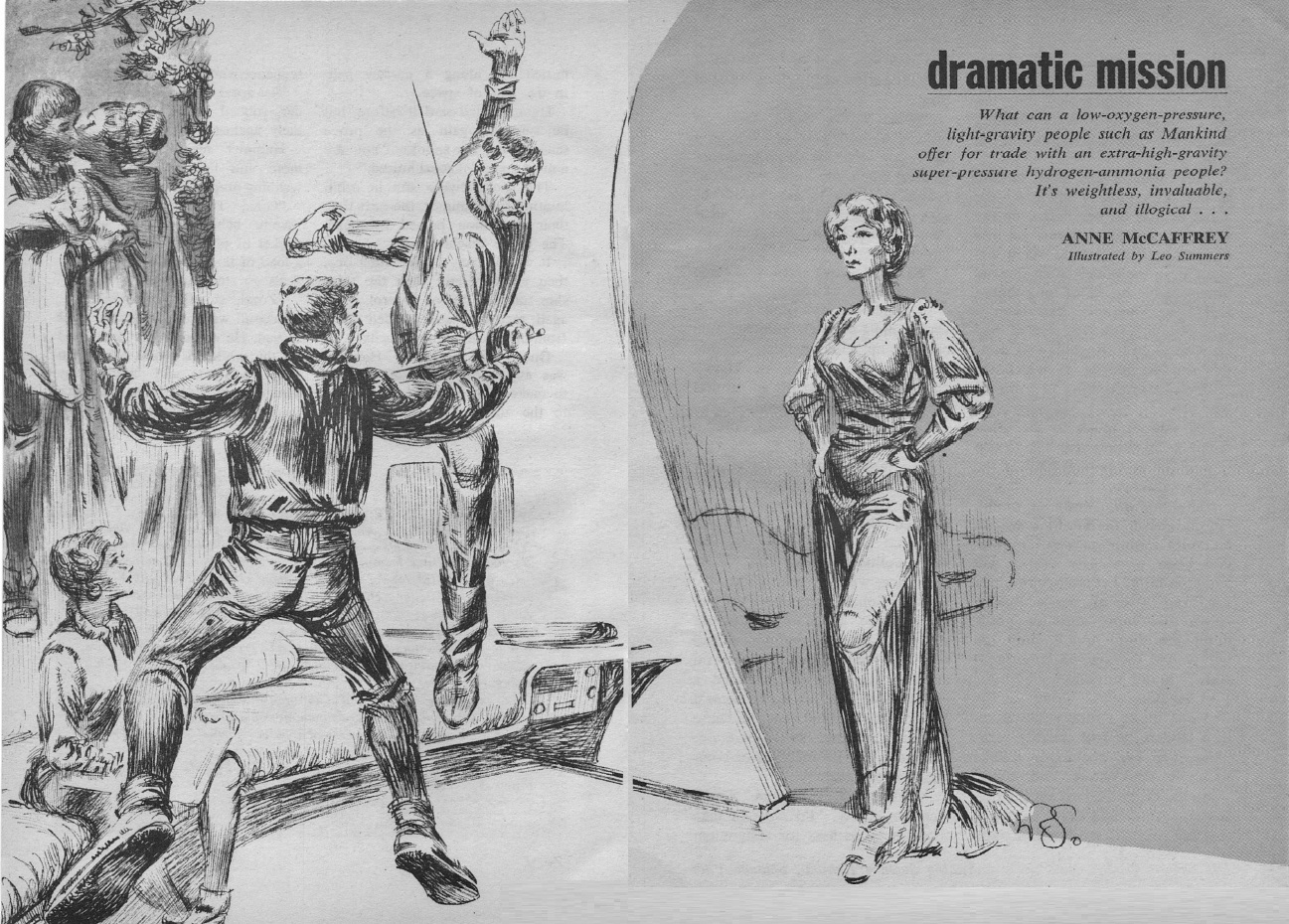
by Leo Summers
Here's the latest installment of the The Ship Who. This series stars Helva, a profoundly disabled woman who, at a young age, was turned into a cybernetic brain for a starship. Together with a series of "brawns", the human component of the ship's crew, she has been on all kinds of adventures.
In this story, we learn that brain-ships can earn their independence (paying off the debt of their construction) and fly without brawns, and that many vessels strive for this status. But Helva prefers to ride with company—indeed, she insists on it.
Well, her wish is granted. Short-listed for a priority mission to Beta Corvi, Helva is tasked to transport a troupe of actors to a gas giant in that system, where they will perform Romeo and Juliet for a bunch of alien jellyfish in exchange for an important chemical process.
The problem is the drama that unfolds before the drama: Solar Prane, the star, is dying from chronic use of a memory-enhancing drug. His nurse is deeply in love with him. His co-star and ex-lover is jealous and stubbornly insists on sabotaging the production. It is up to Helva to be the grown-up in the room and save the day.
There is so much to like about this story, so many neat, unique things about the setting and characters, that it's a shame McCaffrey can't help getting in her own way. She loves writing waspish, unlikeable characters, and her penchant for including casual, off-putting violence reminds me of what I don't like about Marion Zimmer Bradley.
This is one of those pieces I'd like to see redone by someone more talented and sensitive. Zenna Henderson, maybe, if I wanted to see the soft tones enhanced, or Rosel George Brown (RIP) if I wanted something a little lighter and funnier.
Three stars.
The Nitrocellulose Doormat, by Christopher Anvil

by Peter Skirmat
The planet of Terex has turned into a death trap for the terran Space Force. Invited in to deal with an insurgency problem, a combination of religious proscriptions against advanced technology and a flourishing black market that loots what munitions are allowed in, the human troops are not only made into sitting ducks but laughing stocks.
Enter a canny colonel of the Interstellar Corps, whose bright idea is to suffuse all incoming logistics with explosives so that, when they are stolen, they explode. Deterrent and humiliation, all in one.
It may seem that I've given away the plot…and I have. It's given away fairly early on, and the rest of the story is simply an explication of the plan's success.
I should have liked the story less than I did, but it reads pretty well. Three stars.
The Ghoul Squad, by Harry Harrison
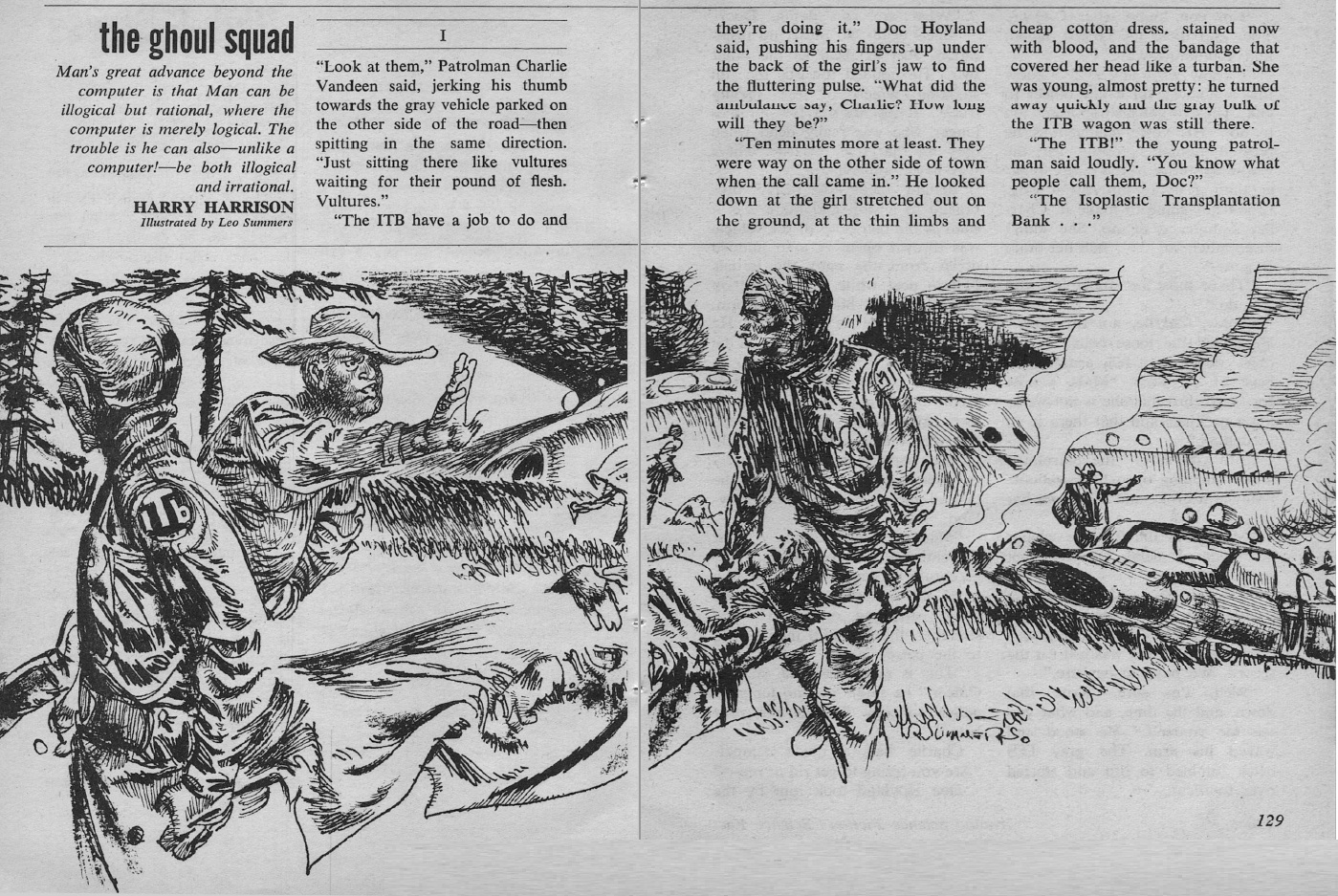
by Leo Summers
A rural sheriff digs in his heels at the notion of government agencies harvesting the organs of newly dead victims of traffic accidents in his jurisdiction. He sticks to his principles even at the cost of his own life, decades later.
This story doesn't say anything Niven hasn't said (much) better in The Organleggers, The Jigsaw Man, and A Gift from Earth.
Two stars.
Jackal's Meal, by Gordon R. Dickson

by Leo Summers
The human sphere of stars has begun to brush against the part of the galaxy claimed by the loosely knit Morah, aliens with a talent for profound modification of bodies, internally and externally. In the middle of sensitive negotiations between the two empires over a contested bit of space, a bipedal creature runs amok at the space dock. It is impossible to determine if the being is a Morah made to look like a human or a human made to look like a Morah. Ultimately, the fate of the two empires rests on this hapless person.
Easily the best story in the issue, both interesting and well written, though it still rates no more than four stars.
Give me the past
Short story SF appears to be on the decline in general, with only four magazines out this month. Of them, Fantasy and Science Fiction was by far the best, garnering 3.4 stars, but Fantastic and New Worlds both barely made three stars, and Mark, who covers the last mag, has been grumbling about all the newfangled, outré stuff.
As a result, you could fill just one digest-sized magazine with all the good stuff that came out this month. In other statistical news, women produced just 8% of all the new fiction this month.
It's enough to make you long for the (romanticized) good ol' days…but who knows what the future holds?


by Gideon Marcus
Goodnight, Percy
If you're anything like me, Peyton Place is something that happened to other people. After all, last season, the first primetime soap opera was scheduled opposite Laugh In, and before that, the 9:30 PM slot in the midst of ABC's insipid Tuesday-night line-up.

But now I feel a little bad that the groundbreaking show is being taken off the air. Based on the 1956 book of the same name by Grace Metalious, the Massachusetts-set serial was salacious for the time, involving as it did a lot of S-E-X, divorce, blackmail, murder, and more. Jack Paar called it "Television's first situation orgy." Johnny Carson quipped that it was "the first TV series delivered in a plain wrapper."

Stars Diana Hyland (standing), Pat Morrow (in can), and Tippy Walker
At one point a few years ago, some 60 million folks tuned in each week for the fun. But nowadays, when the local theater is going blue/stag, and Candy is a mainstream hit ("Is Candy faithful? Only to the book!"), Peyton Place all seems a bit staid. They tried to mix things up by bringing in more teen storylines and also integrating the cast by hiring Percy Rodrigues (Star Trek's Commodore Stone) as the local doctor.

with Ryan O'Neal
Still, you can't beat Dick and Dan, and the series plummetted in the ratings (really—what were they thinking, scheduling it across from Rowan and Martin?) After 514 episodes, the show is going off the air. Which, of course, just means we'll see it endlessly in morning reruns opposite the regular soaps—and you can bet we'll get a revival sometime in the future. In the meantime…

"Goodnight, Lucy. Goodnight, Marshall Dillon. And goodnight to all you kooks on Peyton Place."
Goodnight, Johnny
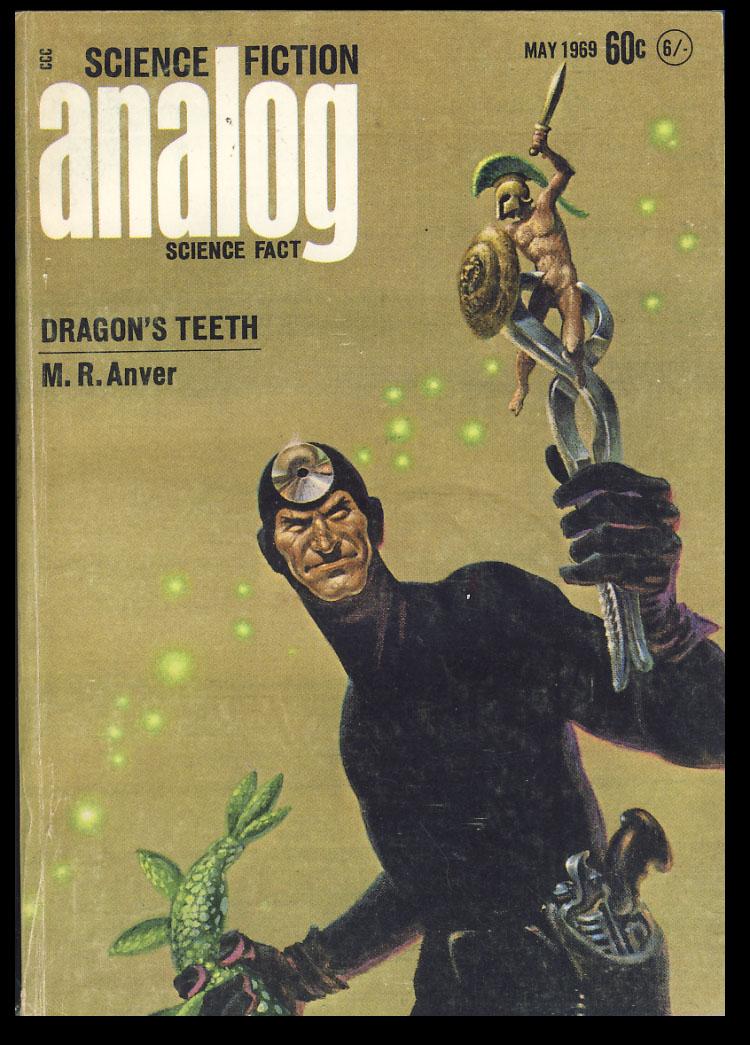
by Kelly Freas
ABC at least knew when to pull the plug on its sinking stone. Analog editor John Campbell, while he did some brilliant work in the '30s and '40s, seems content to stuff his magazine with the dullest dreck that science fiction has to offer. The latest issue is Exhibit 1 for the prosecution:
Dragon's Teeth, by M. R. Anver

by Kelly Freas
A peace conference on a neutral asteroid promises to end a brutal war between humanity and the alien Cadosians. But a faction of extraterrestrials has plans to distrupt the summit by introducing a deadly virus. The question is how they'll smuggle it in…or in whom?
This is a competently put together adventure/mystery—no more, and no less. As such, it's a fine first effort from Mr. Anver, but nothing to write home about.
Three stars.
The Chemistry of a Coral Reef, by Theodore L. Thomas

Science writer and fictioneer Ted Thomas offers up a long piece on coral reefs and how they're made. For an article on stuff that takes place in our oceans, it's awfully dry. Well, at least I know now what they're made of: calcium carbonate. Good for all those fish with indigestion, I guess.
Two stars.
Operation M. I., by R. Hamblen

by Leo Summers
Three weeks of hyperspace are crushingly dull, and the intergalactic service is worried about the morale of their solo couriers, who have to endure the period without diversion. Apparently, books and booze aren't enough.
So the ship's computer on the latest FTL ship is programmed to act like a nagging mother-in-law so each pilot is more irritated than bored.
Terrible piece. One star.
Persistence, by Joseph P. Martino

by Kelly Freas
This is a sequel to the story Secret Weapon. The Terrans have now got a leg up on their war with the Arcani, now destroying 3-4x as many vessels as they are losing. However, this proportion is still below what the Big Brains in military intelligence expected. Our hero, Commander William Marshall, is certain that the aliens have developed Faster Than Light ("C+") communications and are using them to thwart our patrols.
The story is devoted to the reverse engineering of a captured Arcani corvette, tediously going through each electronic gizmo to see how it is wired and what it is wired to. Eventually, the existence (or lack) of a C+ radio will be proven.
Once again, the story is dull as dirt, and worse, poorly edited. There's an art to writing successive paragraphs using different words. Martino will repeat set phrases several times in a row, the sign of an unfiltered brain-to-typewriter stream of consciousness.
Also, women of the future still remain in the 1950's, socially.
Two stars.
The Five Way Secret Agent (Part 2 of 2), by Mack Reynolds

by Kelly Freas
As we saw last month, Rex Bader, last of the private dicks in the People's Capitalism of America's late 20th Century, had been tapped by no fewer than five organizations to spy on each other as Bader went off to Eastern Europe and make contacts. This passage explains it all:
He stared at the screen in disbelief.
This whole thing was developing into a farce. Roget wanted him to make an ultra-hush-hush trip into the Soviet Complex to contact his equal numbers with the eventual aim of creating a world government based on the international corporations.
Sophia Anastasis, of International Diversified industries, thought such a world government would upset the status quo to the detriment of what was once called the Mafia, and wanted all details.
John Coolidge and his group [the successor to the FBI] were afraid such changes would upset the governmental bureaucracy and the military machine and wanted to prevent it from happening.
Colonel Simonov felt the same from the Soviet viewpoint, and wanted to maintain the status quo.
Dave Zimmerman was all in favor of world government but wanted the Meritocracy which would run it to be elected from the bottom up in each corporation, rather than being appointed.
And every damned one of them thought that their part of the operation was a secret.
Once Bader gets to Czechslovakia and Romania, the book reads like typical Reynolds: historical parallels (none after 1969, of course), tourism (we learn about the national drinks of the Warsaw Pact), and mildly droll high jinks. It seems that Bader's cover is blown wherever he goes, suggesting a traitor somewhere in the works among his five employers.
There could have been a good mystery here, but it's all thrown in too little, too late. Moreover, it's clear that this two-part serial is really just the first half of a longer book.
As a result, the whole is lesser than the sum of its parts. I give this segment three stars, and three stars for the book as a whole (so far).
Initial Contact, by Perry A. Chapdelaine

by Kelly Freas
The Eridanians are coming! Responding from signals broadcast by Project Ozma, an alien ship has been dispatched from Epsilon Eridani. After twelve years at near light speed, the vessel is about to arrive—and the press is filled with concerns of an impending alien takeover.
It all stems from a mistranslation of their latest message, suggesting their intent is conquest rather than coexistence. In the meantime, there is a lot of Keystone Copping as the head of the Ozma IX project tries to tamp down on the paranoia.

by Kelly Freas
The best part of the story is the "universal message" broadcast by the Eridanians, hatched up by author Chapdelaine. He explains it in the story—see if you can figure it out yourself.
But in the end, the story is rather pointless and forgettable. Two stars.
Goodnight May

Doing the math, I find that April (postmarked May on the magazines) was a dreadful month for short science fiction. Not a single magazine topped 3 stars, and Analog came in at a dismal 2.3. For posterity, the rest were New Worlds (2.7), Venture (2.7), Amazing (2), Galaxy (3), and IF (3), and Fantasy and Science Fiction (2.7)
Even more disheartening: you could take all the 4-star works (nothing hit 5 stars this month) and barely fill a Galaxy-sized thick digest. Women wrote 20% of all the new pieces published in April, which sounds impressive until you realize that six of the works were short poems in New Worlds, all by Libby Houston.
I am already hearing rumblings about Galaxy and IF's editor Fred Pohl getting the heave-ho, and Amazing's editorial musical chairs is legendary. ABC dumped Peyton Place—is it time for someone to cancel John Campbell?

by Janice L. Newman
On December 23rd, 1968, exactly eleven months after they were captured by North Korea, the crew of the USS Pueblo was finally released, and the world breathed a collective sigh of relief. The USA would not be starting World War III over the incident, and our boys, though they’ve been starved and tortured, are coming home alive for Christmas.
It is thus appropriate that this week’s Star Trek episode revolved around choosing peace instead of war.

Bill Theiss, you've done it again!
In the episode opener, we learn that the Enterprise has been sent to support Petri, Ambassador of Troyius, in his mission to “train” the Dohlman of Elas to be a suitable wife for the Troyian leader. The Dohlman turns out to be a beautiful woman played by France Nuyen, made up to look like Cleopatra in a bathing suit. Her name is Elaan, and she is imperious and demanding, while Petri is servile but contemptuous. They are intractable in their dislike of each other. Kirk quickly becomes exasperated with both of them, telling Petri, “Stop trying to kill each other. Then worry about being friendly.”
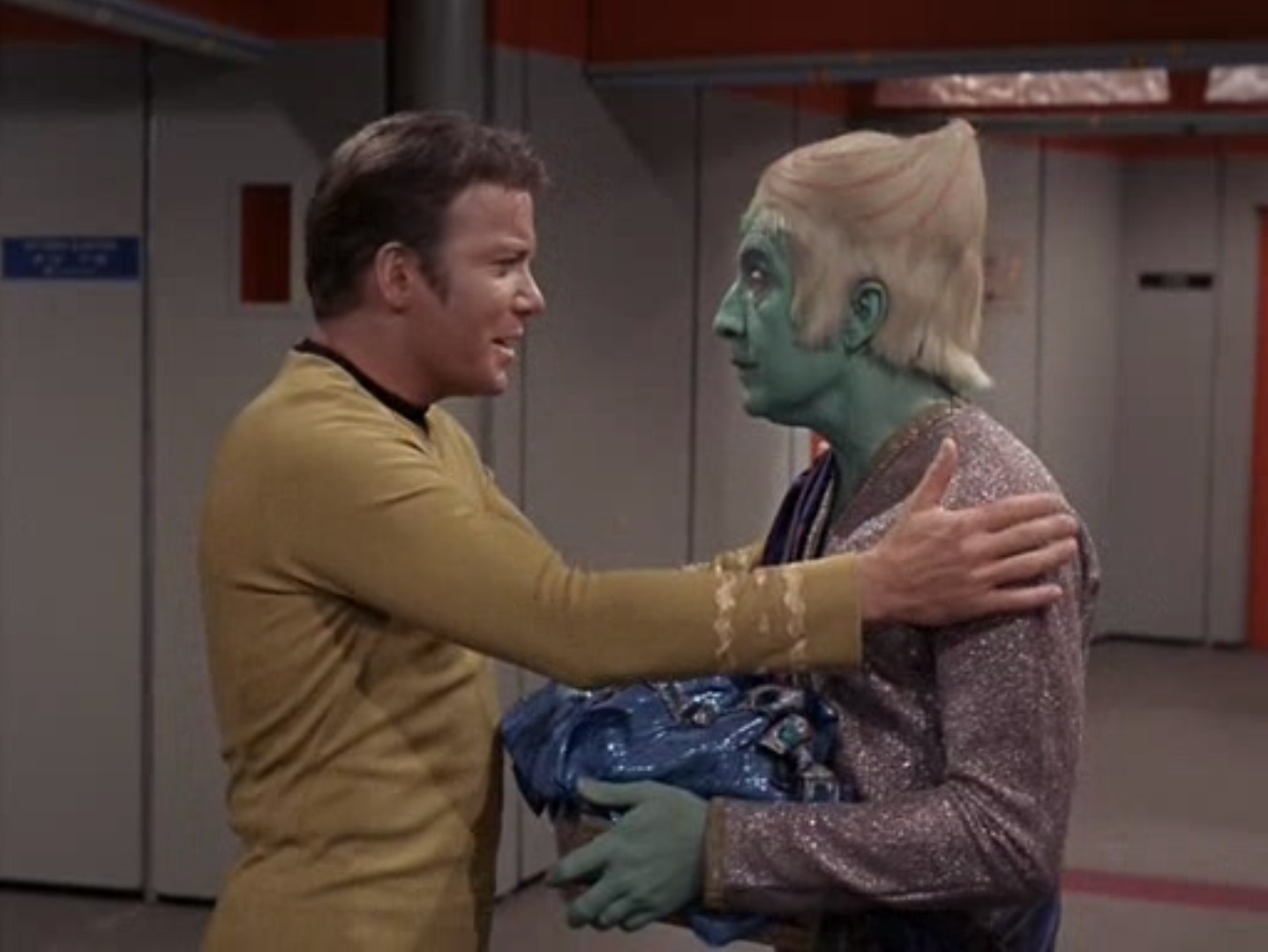
"And maybe try wearing a bikini…"
In the meantime, the Enterprise is being followed by a “ghost” ship, which eventually materializes and proves to be a Klingon warship. This is a nice callback to Balance of Terror, where the Enterprise played the part of the “ghost ship”, and the recent Enterprise Incident, where we learned that the Klingons now have cloaking technology.
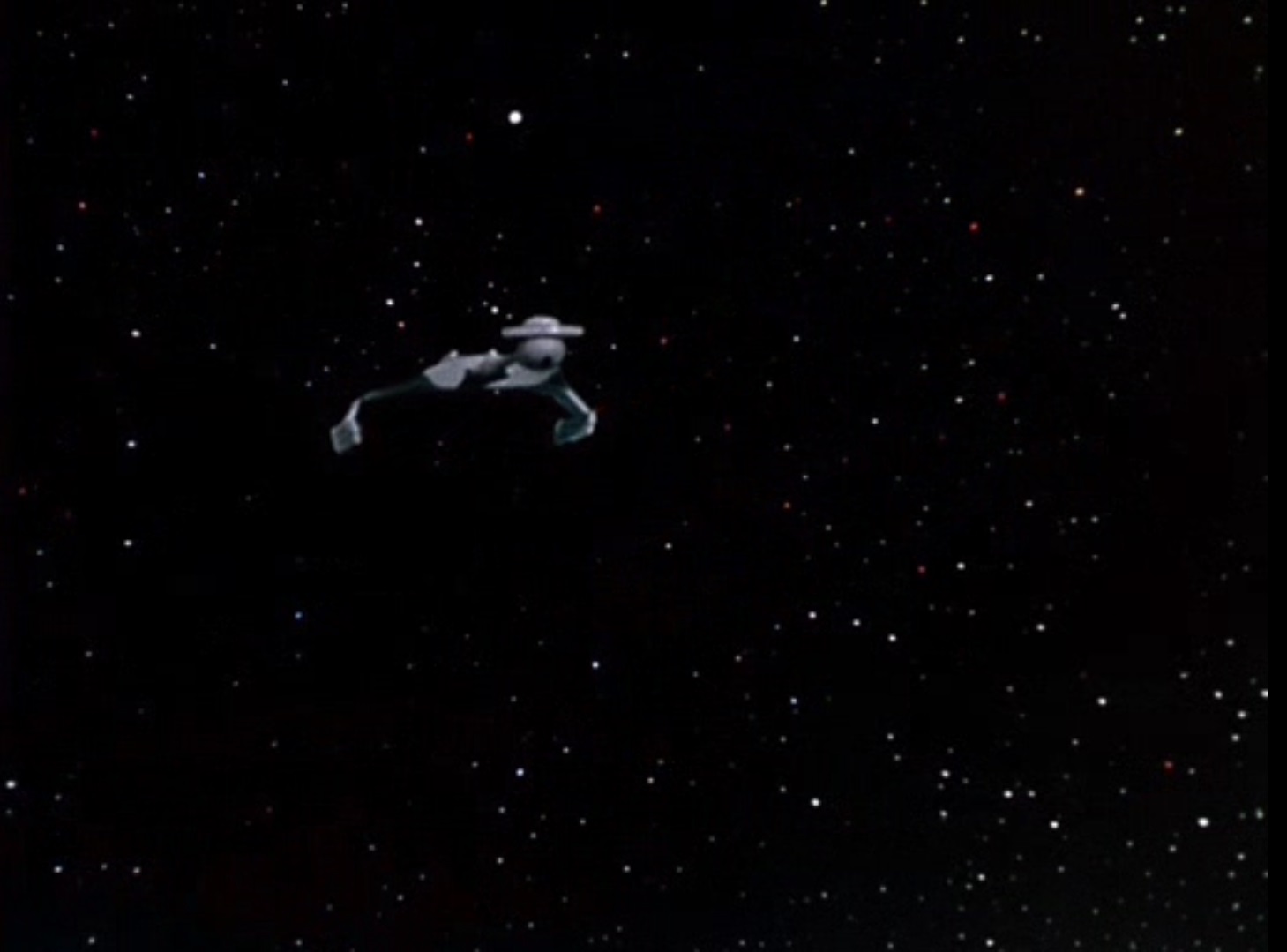
"Follow that starship!"
No sooner does the ship reveal itself than Kirk is called away from the bridge again. Elaan has stabbed Petri, who declares that he will have nothing more to do with her. He also explains to Nurse Chapel that the mysterious “allure” of Elasian women is merely biochemical: “A man whose flesh is once touched by the tears of a woman of Elas has his heart enslaved forever.”
Back in Elaan’s quarters, Kirk is fed up and declares that he will be Elaan’s new teacher. He tells her she is, “an uncivilized savage, a vicious child in a woman's body, an arrogant monster!”
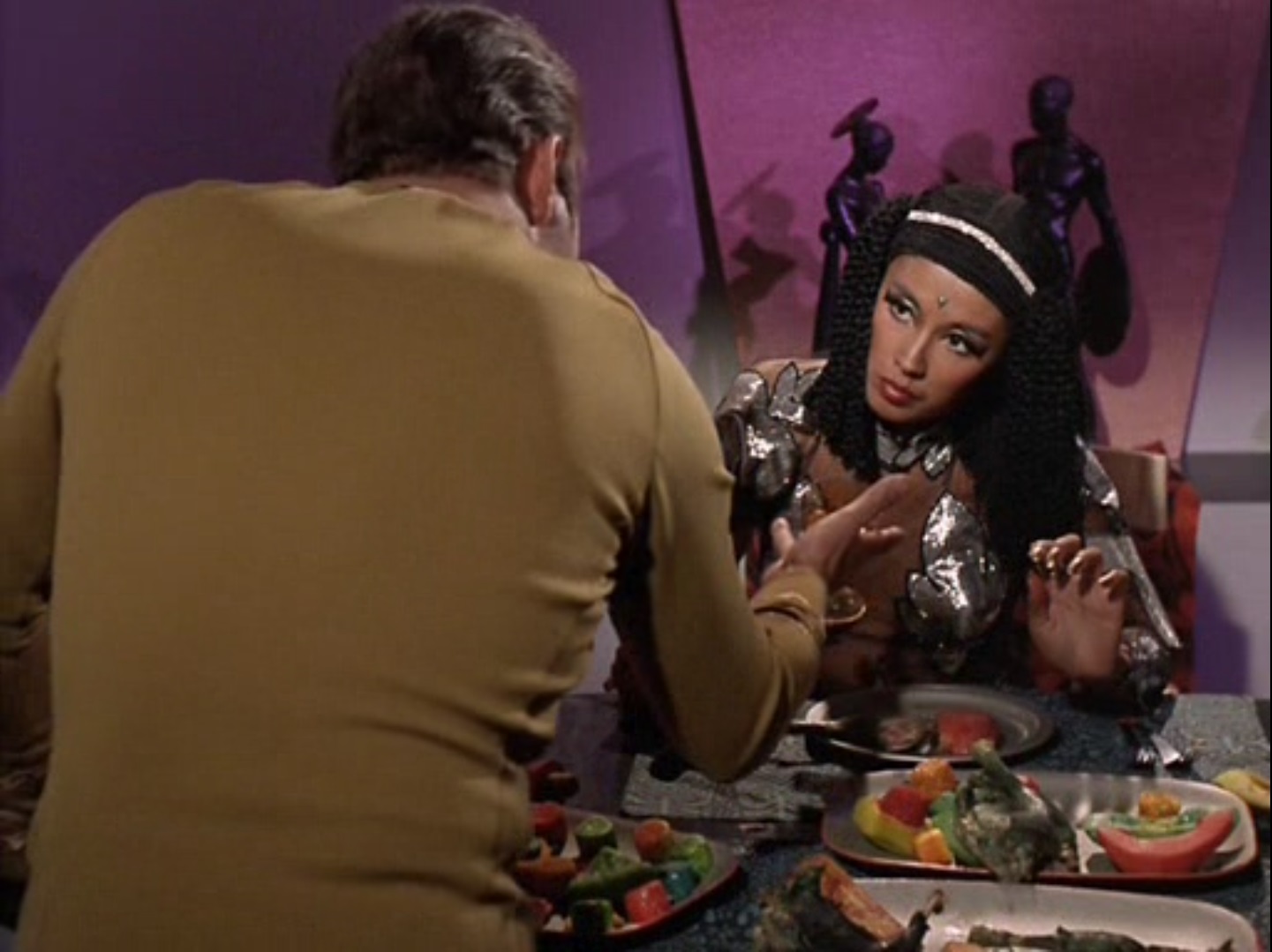
"I said, 'Gimme five'—you've got to learn modern courtesy."
I must admit, my sympathies were thoroughly with Elaan. Despite her imperious attitude in the beginning, it becomes increasingly clear that she has no choice in the political marriage and no desire to be married. At one point she says, “I will not go to Troyius, I will not be mated to a Troyian, and I will not be humiliated, and I will not be given to a green pig as a bribe to stop a war!” And yet, the Enterprise continues on its way to Troyius, regardless of her behavior, her orders, or her protests. It seems she has no true power, but is merely a pawn to be traded, and probably one the Elasians don’t actually care much about.
In fact, I had to wonder if the Elasians didn’t want peace at all, but sent their “Dohlman” to be married as a sop to the Federation. That way they could say they’d tried, and if the Troyians couldn’t handle the Dohlman, well that just proved that peace wasn’t possible between them.
This also nicely sets up the question of why the Federation cares so much about stopping the war between these two planets, to the point of bringing diplomatic pressure and sending one of their best starships to ensure that the wedding and negotiations go well. Scotty blatantly asks the same question in the episode opener, leaving it to rest in the back of our minds as we watch.
The next day, Kryton, one of the Elasian guards, sneaks into Engineering and sabotages the Enterprise. Kirk forces his way into Elaan’s quarters and again begins trying to “teach” her, which mostly consists of wrestling with her and threatening to spank her. She starts to weep, and he wipes away her tears. The effect is immediate, with Kirk’s ire evaporating and transforming into passion.

"Say, you didn't just hear a kind of snake rattle sound, did you?"
Kryton is caught, and kills himself rather than allow himself to be subjected to a Vulcan mind meld. Kirk orders Scotty to figure out what Kryton did, then returns to Elaan’s quarters. Elaan tries to convince Kirk to work with the Klingons, but he tells her there are more important things than love: “Elaan, two planets, an entire star system's stability depends on it. We have a duty to forget what happened.”
At this point, those of us who have been watching Star Trek since the beginning already know what’s going to happen: Kirk will always choose the Enterprise over everything else. And indeed, when Spock and McCoy come to roust the captain out of Elaan’s quarters, all it takes for him to leave Elaan behind is to hear that the Klingon ship has changed course and is approaching at warp speed.
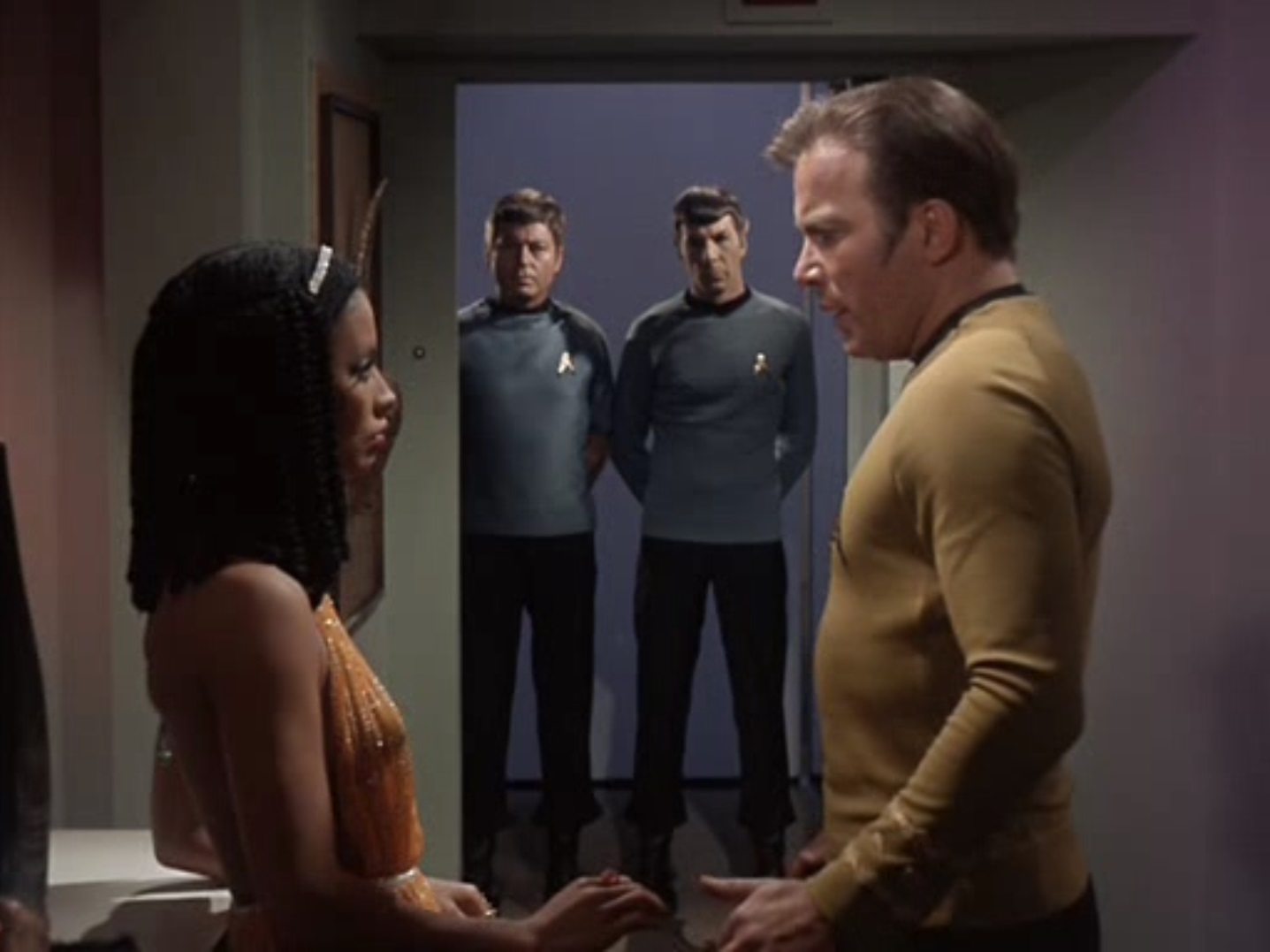
"Don't mind me. I always walk this stiffly when my friends are watching…"
Once Kirk gets to the bridge, we’re treated to one of the best combat sequences we’ve seen yet on Star Trek. Kryton’s sabotage, Kirk learns at the last possible moment, was rigging the matter-antimatter unit to blow if the ship went into warp. The Klingon ship therefore starts by trying to bait the Enterprise into going into warp, and that doesn’t work, just firing on them.
The captain sends Elaan to Sickbay because it’s the safest part of the ship. Petri speaks to her there, finally treating her with a modicum of graciousness and respect, and asks her to wear the necklace gifted her by the Troyians, “as a token of respect for the desperate wishes of your people and mine for peace”. She seems genuinely affected by the words and gesture, perhaps realizing that Kirk will truly never sacrifice duty for love.
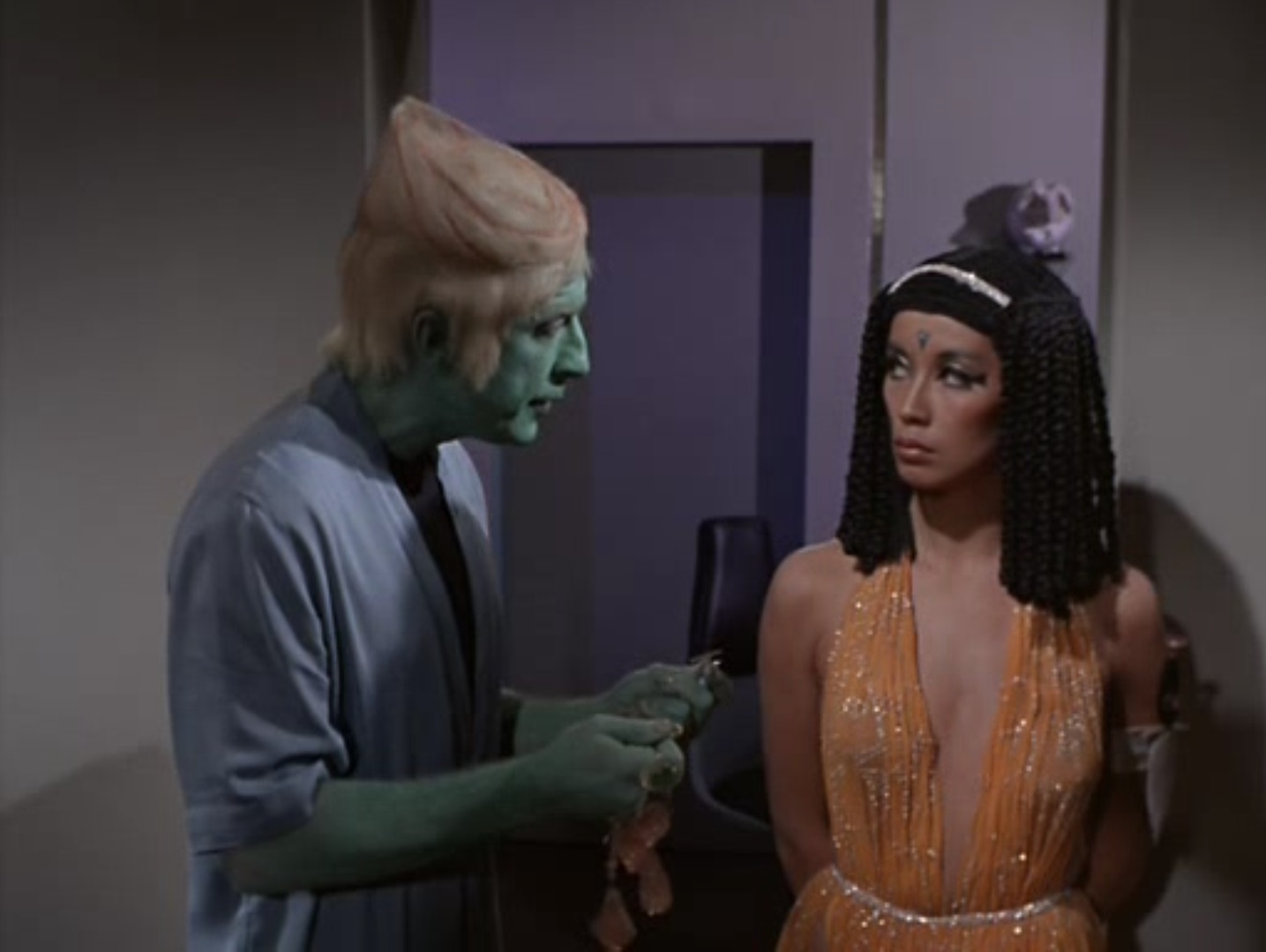
"Please put these on. The Emperor paid retail."
Back on the bridge, the crew struggles to keep the Klingon ship’s hits to its best shield (Kirk doing a bit of back seat driving as he leans over Sulu and gives him his orders). An impulse-power driven ship is no match for warp, though, and all seems lost.
Elaan appears on the bridge, wearing the Troyian wedding dress and necklace. Spock immediately notes that there are strange readings coming from the necklace. It turns out that the stones, which Elaan says are “common”, are dilithium crystals! (No wonder the Federation and the Klingons are both so interested in this system!) She gives them to the Captain, who has Spock hurry them down to Engineering, where he and Scotty start installing them. Kirk does his best to stall, but the Klingons are unwilling to discuss terms (I imagine that after “The Enterprise Incident” and The Deadly Years, the Klingons have been instructed not to listen to anything the Federation says—or at least nothing that Kirk says.)
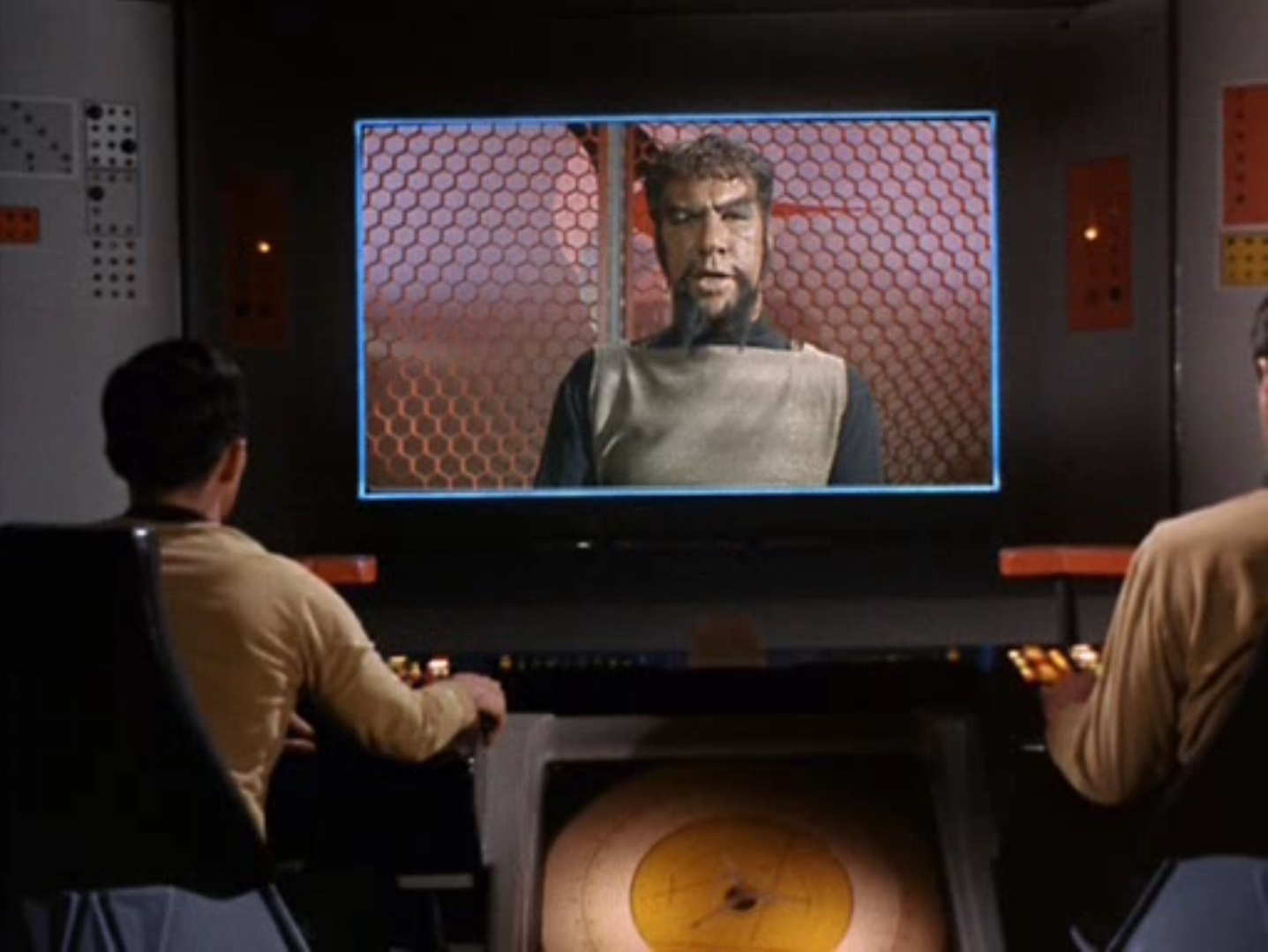
This fellow is no Michael Ansara. He's not even a William Campbell…
The crystals are ready in the nick of time. A photon torpedo at close range leaves the Klingon ship damaged and limping. The Enterprise leaves it behind to fulfill its original mission.
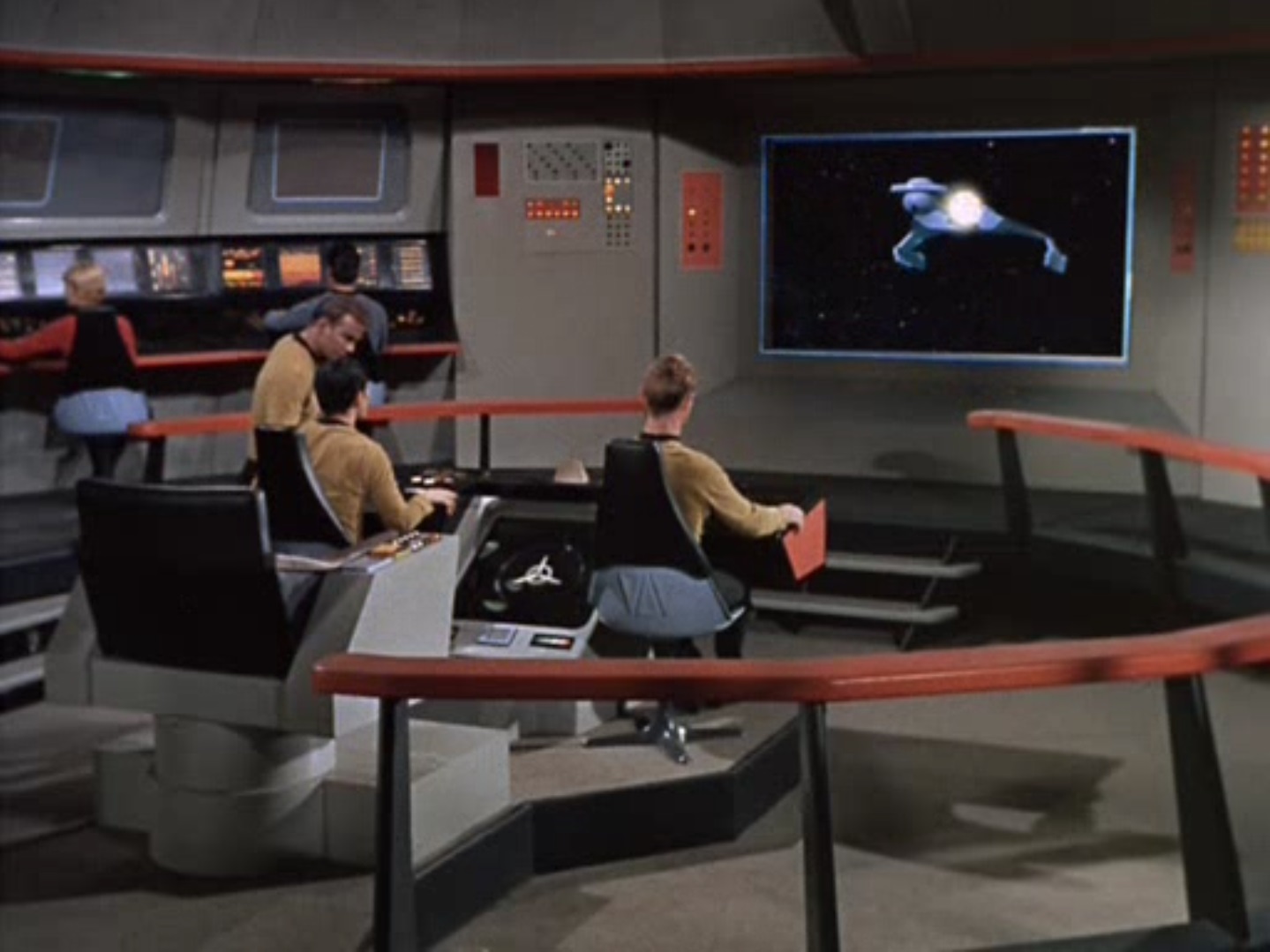
Pow! Right in the kisser.
Kirk says farewell to Elaan, who asks him not to forget her. He tells her he has no choice. Nor does she, she replies, only duty and responsibility. It’s clear that she’s come to accept her role, though whether it’s because she realized that her last desperate play to manipulate the captain failed or because her near-death experience made her decide that peace was more important than her personal feelings, we do not know. It is also worth noting that while she goes on to marry into a culture she despises and where she will likely be surrounded by people who hate, fear, and ridicule her (if Petri’s behavior is any indication), Kirk will simply continue doing what he loves. Her choice of “duty” over all else is thus, in my estimation, a far more difficult and admirable one.

"Oh, this knife? I was just going to pare my nails. Not kill the Emperor or anything like that, why do you ask?"
McCoy, unsurprisingly (given his track record) discovers an antidote to the Elasian tears. Spock tells him the captain has no need of it, as he’s already found his antidote: the Enterprise.
There were many things to love in this episode, and many things that frustrated me. The “Taming of the Shrew” sequences early on were grating, but the combat was excellent, and to the scriptwriter’s credit, the story did not end with Elaan being “tamed”. In the end, she makes a choice to accept her fate, but she does so with dignity.
The things I liked and didn’t like balanced out pretty well, leaving this a three star episode for me.

by Gideon Marcus
The Sum of its Parts
What I found so gratifying about "Elaan of Troyius" was its continuity with the Trek history we've encountered thus far. Once again, as in "Journey to Babel", the Enterprise is host to a diplomatic mission (though how the ship could house several dozen delegates to the Babel Conference, but Uhura had to give up her room for Elaan, is never explained). Once again, Kirk shows irritation at having to play nursemaid to a bunch of civilians. I would find his flip treatment of Elaan demeaning, but it's no worse than he displays to Commissioner Ferris or Commissioner Fox.
I particularly loved the galactopolitical situation depicted in the episode. Here we have a fairly new Federation system with two hostile planets, abundant with dilithium crystals, perched right at the edge of the Klingon Empire. What a fraught situation Kirk must navigate!
At first, it was difficult for me to glean the plot behind the plot, but by the end of the episode, the setup was pretty clear. The Federation, upon learning of the rich deposits on Elaas (and Troyius?) placed a clamp on all dispatches coming out of the system. Not good enough, though, as the Klingons clearly want the worlds badly, too. The Feds then explained to the two worlds in the system that they must work things out. Elaas grudgingly agrees—and then effects two simultaneous plans to queer the deal.
The first is Kryton's sabotage. By handing the Enterprise over to the Klingons, they get in their good graces (if, indeed, the Klingons have good graces). Obviously, the savage Klingons are a better fit for for the militaristic Elaasians anyway.
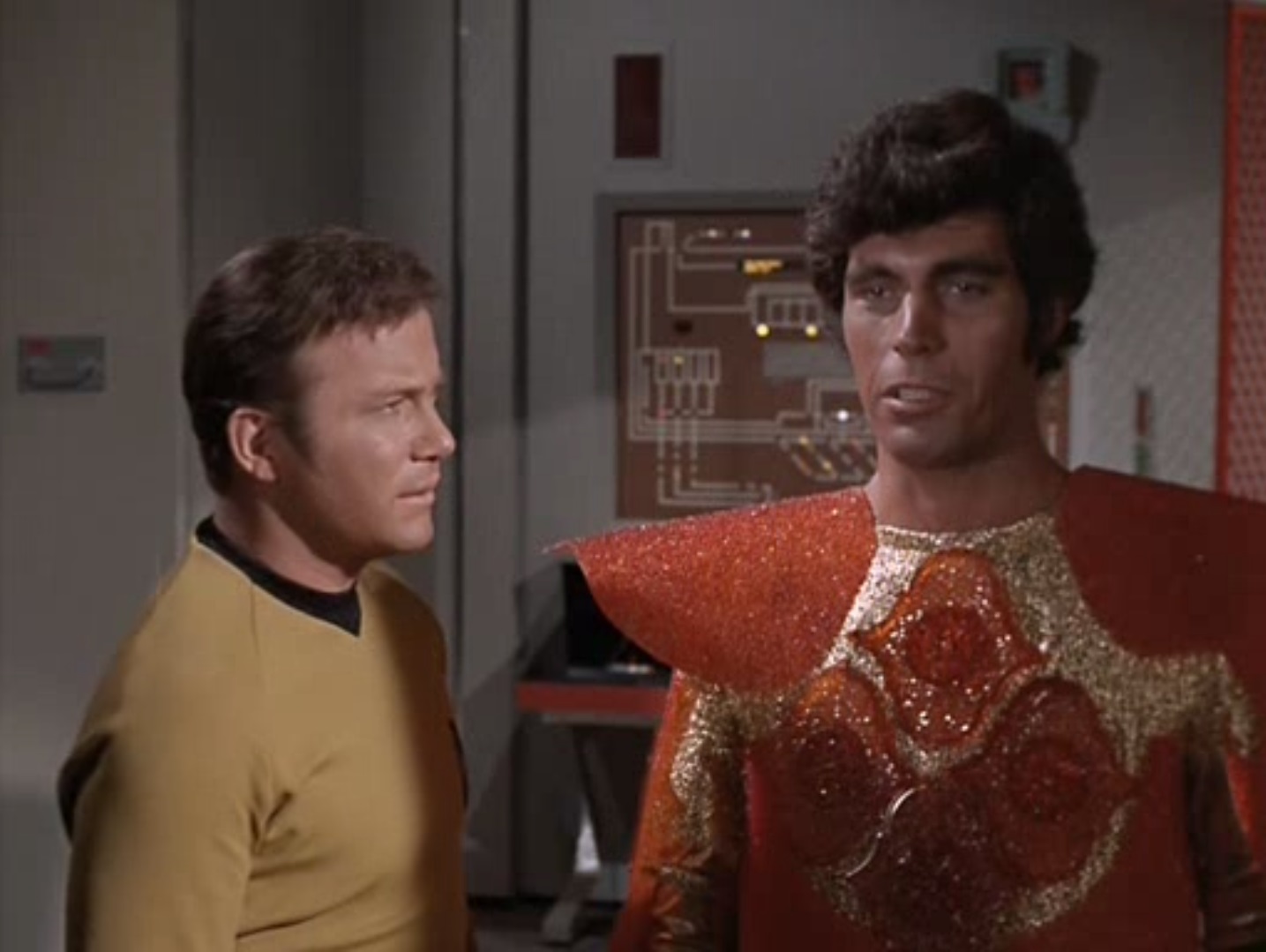
"Of course I want to be a Klingon—you think I want to keep wearing this outfit?"
The second is Elaan. She clearly doesn't want to be there. Indeed, she does everything she can to get out of it, despite orders from the Elaasian council. Elaan goes so far as to try to murder the Troyian ambassador and seduce the captain of the Enterprise. And yet, that scheme fails when Elaan takes a page from Kirk's book, and indeed the example of the whole crew, that duty and the preservation of life trumps all else. It's a quick, undershown change, but it's there, and I appreciated it.
The episode reminds me a bit of the parable of the peasant woman who shelters a starving prince. The royal promises to give a gold coin for every fat bubble in the soup she serves. Greedily, she dumps a huge pat of butter in the soup, which results in one big bubble rather than a myriad of little ones. Similarly, if the Elaasians had stuck to just one plan, they might have succeeded. Instead, they double hedged and lost all.
And was the Klingon commander operating with Imperial sanction? Or was he a rogue skipper with notions of glory? After all, taking on a starship seems pretty bold given the ever-watchful Organians.
It's not a perfect episode, but it's certainly an engaging one, and I always enjoy seeing Mrs. Robert Culp on the small screen. Plus, her appearance alongside Shatner is something of a reunion—they starred together in the Broadway version of The World of Suzie Wong. Plus, I dug both the Klingon ship (which we saw a bit of in "The Enterprise Incident" and "Day of the Dove") and the score for the episode.
Four stars.
Twixt Scylla and Charybdis

by Trini Stewart
The beginning of this week's episode did not seem promising to start, mostly because of the guest characters' first impressions on me. Petri the ambassador seemed childish and reckless in his peacemaking, and Elaan was almost comically uncooperative for royalty sent as a hospitable offering. Looking back, Elaan was possibly playing to her strengths to some end with her antagonistic reactions, and her development with Kirk ultimately became a gripping trial for our captain.
Kirk was the shining star of this episode, which is not something I feel about him often. He was impressively quick-witted against biochemical and psychological manipulation, which really sold his captain qualities for me more than his usual speeches or fights. The way Kirk kept his priorities in check while thinking on his feet reminded me of how Spock left me feeling in "The Tholian Web" when he held the ship together without Kirk. In the short time I have known Kirk, he has struck me as the type to always know what to say and fight when there is no other choice. Kirk managed to unravel the layers of the princess's antics even with serious disadvantages, revealing what his problem solving is like when he is out of sorts. Tension was well-built in this episode on several levels, and the challenges Kirk faced were arguably more dynamic and interesting than Spock's in "The Tholian Web".

"What's a case of tight trousers when the Enterprise is at stake?"
Kirk transitioned from acting as a respectful host to a firm authority with Elaan, and his initial responses to her rude behavior were tastefully poised. Once Elaan had seduced Kirk, he still managed to expertly dismantle the Elaisians’ schemes without falling for the Dohlman or her subordinates’ clever tricks. Shatner did a great job conveying how difficult it was for Kirk to maintain his composure, so it was riveting to see just how he would escape the Klingons, prepare the guileful Elaan for her marriage, and get the Enterprise back in ship shape under that level of duress. His allegiance to the Enterprise evidently sobered Kirk; his articulate maneuvering reflected his symbiotic relationship with the ship and her crew. In the end, even Elaan was humbled by our captain, finally submitting to the responsibilities her title bore. I was quite pleasantly surprised by Kirk this week, and the adversities threatening the crew were positively captivating. 4 stars!
Be Our Guest, Do As You Please

by Joe Reid
“Elaan of Troyius” was this week’s episode of Star Trek. “Taming of the Shrew” storyline aside, there is one thing that the writers of Star Trek keep doing to twist my britches, and this episode was another example of it. The Enterprise, powerful symbol of human achievement, has the laziest security imaginable. Episode after episode, people that wish to do harm to the ship and its crew need only to walk into what should be the most secure areas of a ship to do as they please practically unchallenged. Areas that on large ships, not all members of the crew are even allowed to enter. So, let’s delve into some of areas of a ship that guests should not enter.
Let’s begin with the command center of the ship. The bridge. The seat of command, where the captain steers the destiny of a ship to complete its missions. Obviously, a perfect place for a teenage princess to casually enter whenever she chooses. Elaan pierced the bridge and interrupted the ship’s captain, while he was in the middle of a combat situation. Good on the writers for making the captain, thanks to Spock’s urging, send her away from the bridge, only to have her show up on the bridge again after a change of clothes. For an area holding some of the most senior members of the crew, it seems unusual that it wasn’t better protected. Past episodes showcased singing children, enemy androids, and furry tribbles having free access to the brain trust of the Enterprise. I anticipate that 15% of Kirk’s problems could be solved by securing access to the bridge to “Bridge Crew Only”.
The next ludicrous pattern that we witnessed in this episode was the open and unguarded access that guests on the Enterprise had to Engineering, the area of the ship that provides all the power, without which the Enterprise couldn’t move, fight, or support human life. Why did Elaan’s former suitor have a free ticket to stroll into this most vital part of the ship and sabotage systems? Again, good on the writers for allowing him to be discovered, be it many minutes later, only to allow the discoverer to be summarily executed for his weak efforts to question someone he'd found messing with the thing that keeps the ship alive. If only this random trespass in Engineering were rare. Previous episodes sported children again, along with genetically advanced conquerors, self-aware talking space probes, and Klingons traipsing merrily into the bowels of Engineering.
Where before I said that 15% of Kirk’s problems could be solved by securing the Bridge, 99% of problems could go away if Engineering had a couple guards working shifts to protect the very heart of this starship.

If only Kevin Riley were on duty, none of this would have happened. So long as he's sober…
Historically there have been some areas of the ship that have been kept secure week after week. Areas that no one can casually walk into without permission (unless you are a floating cloud of space gas that is). Those would be crew quarters. Even in this week’s episode, crew quarters were better guarded, and their doors are better respected, than what should have been the most sensitive areas of the ship. Not even Spock and McCoy could casually walk into the room where the captain was passionately kissing Elaan.
Perhaps future episodes will take the security of the most critical parts of the ship more seriously. That, or have the crew consider moving the engines and bridge staff to crew quarters, where doors are respected.
For continuing to overlook this easily solvable problem, I offer only 2 stars for “Elaan of Troyius”. Ignoring the fact that the episode did display some interesting makeup and costumes, and featured a few well-acted scenes, the continued stupidity of the security of the ship is as untenable as its “secure” areas.
Two stars
[Come join us tomorrow night (January 3rd) for the next thrilling episode of Star Trek! KGJ is broadcasting the show live with commercials and accompanied by trekzine readings at 8pm Eastern and Pacific. You won't want to miss it…]

by Gideon Marcus
Star Trek is usually defined as an "action-adventure show" or maybe just a "science fiction program". While it is the first truly SFnal production on television (The Twilight Zone and The Outer Limits had their moments, but for the most part, their science fiction was primitive), for its first two seasons, it tended to hew close to its '40s era Astounding Science Fiction roots.
With last week's episode, that all changed. The 1960s, and the experimental New Wave movement, has arrived on television.
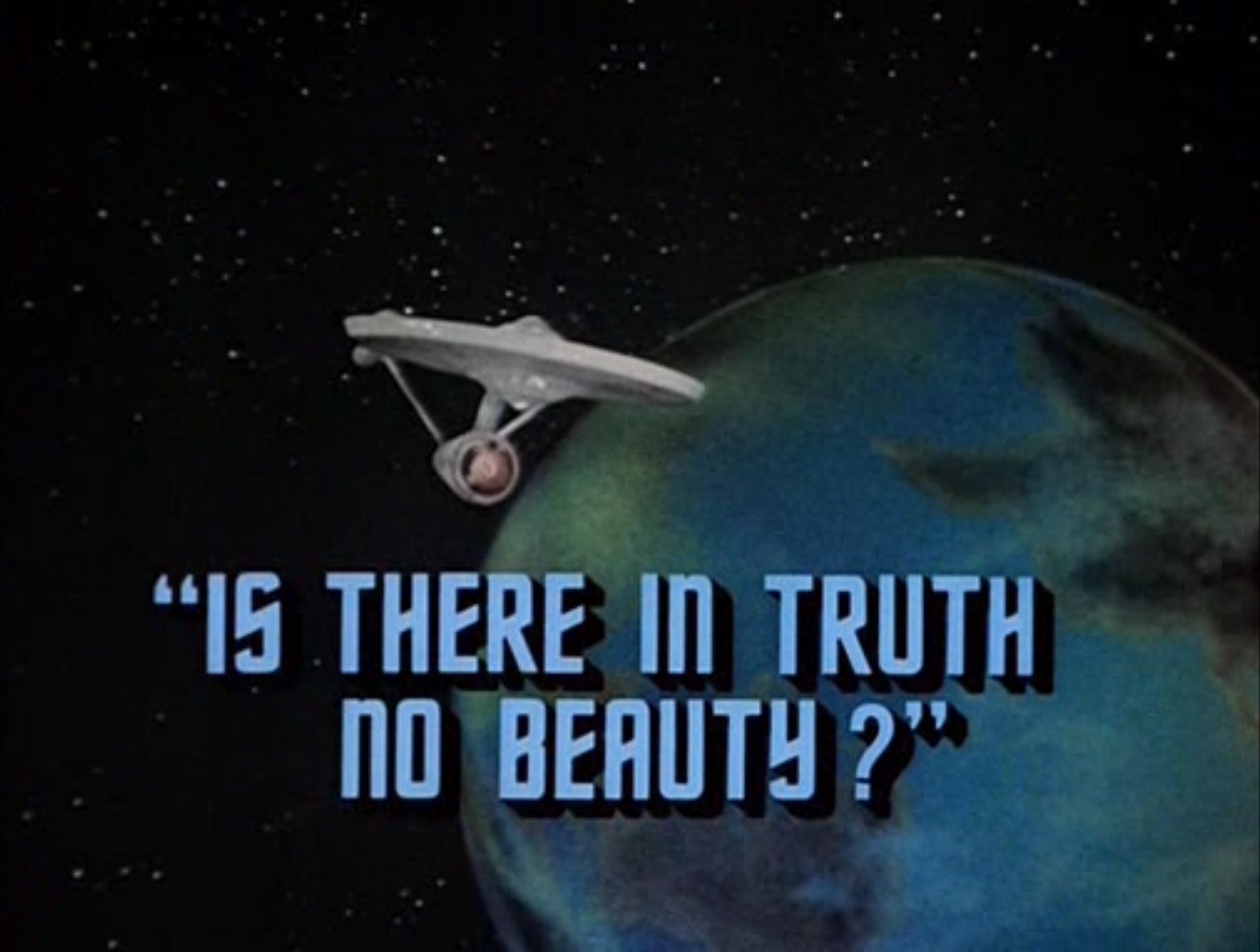
Diana Muldaur returns to Trek as Dr. Miranda Jones, a human telepath who has never seen Earth, but who spent four years on Vulcan learning to master and tame her profound powers. She has been tapped to serve as ambassador to the Medusans, a race of inchoate aliens of sublime thoughts and profound navigational abilities, but whose appearance is so hideous as to render all humans who see them insane. Jones is accompanied by the Medusan ambassador to the Federation, Kollos, who spends most of his time in a box for the safety of the crew.
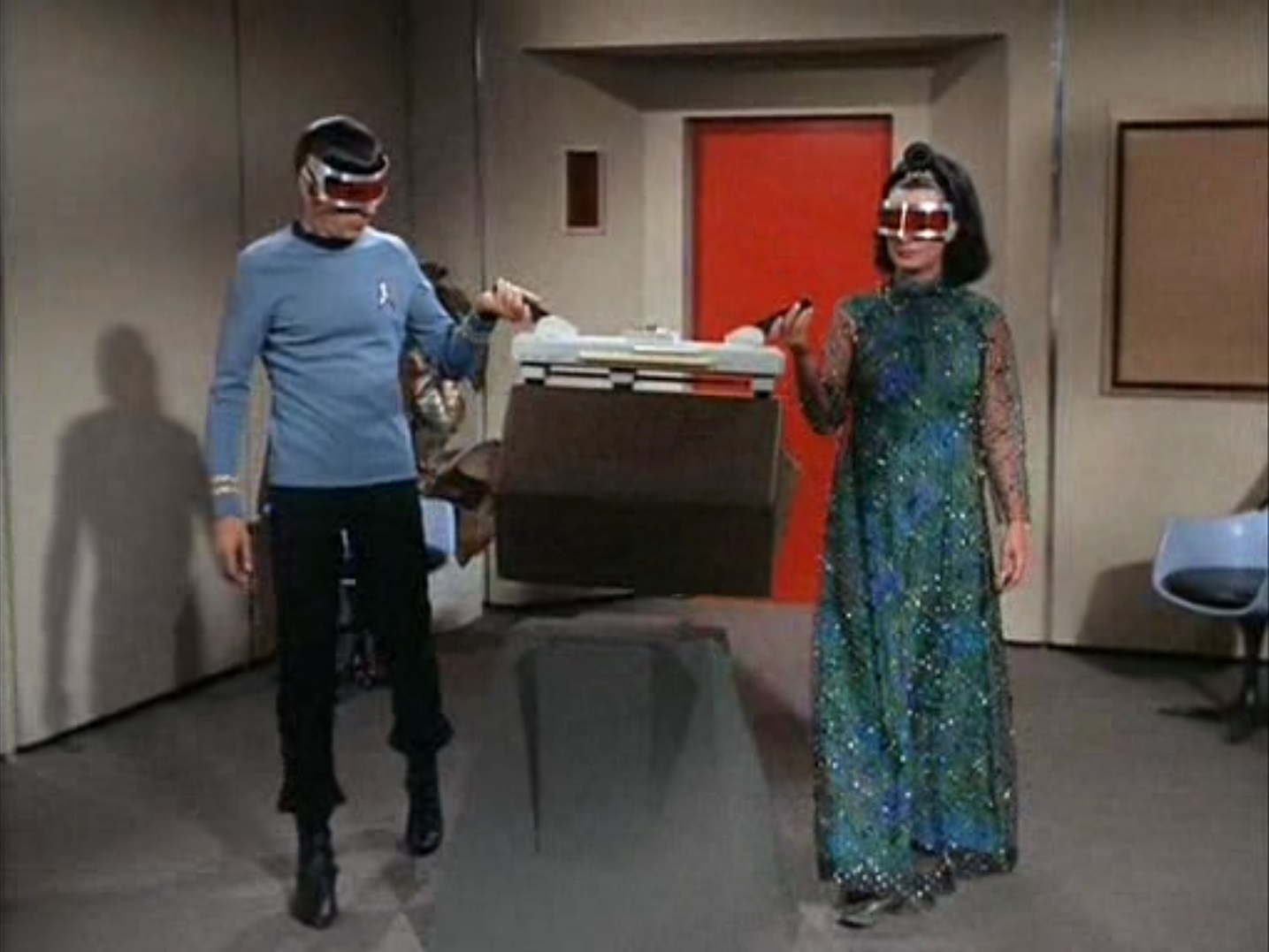
Ambassador Kollos is brought to his quarters by Mr. Spock and Dr. Jones
Jones is a meaty role, much more interesting than when Muldaur played Dr. Ann Mulhall in "Return to Tomorrow", and Muldaur plays it perfectly. Her demeanor is largely arch and cool, as befits Vulcan stoicism, but there are flashes of the human, too: jealousy regarding her unique relationship with Kollos, which she feels is threatened by Spock, who can both look at Kollos and communicate with him; irritation at the parochial behavior of the Enterprise's senior officers, who can't believe she'd give up on men to live with a monster; resentment when things do not go her way.
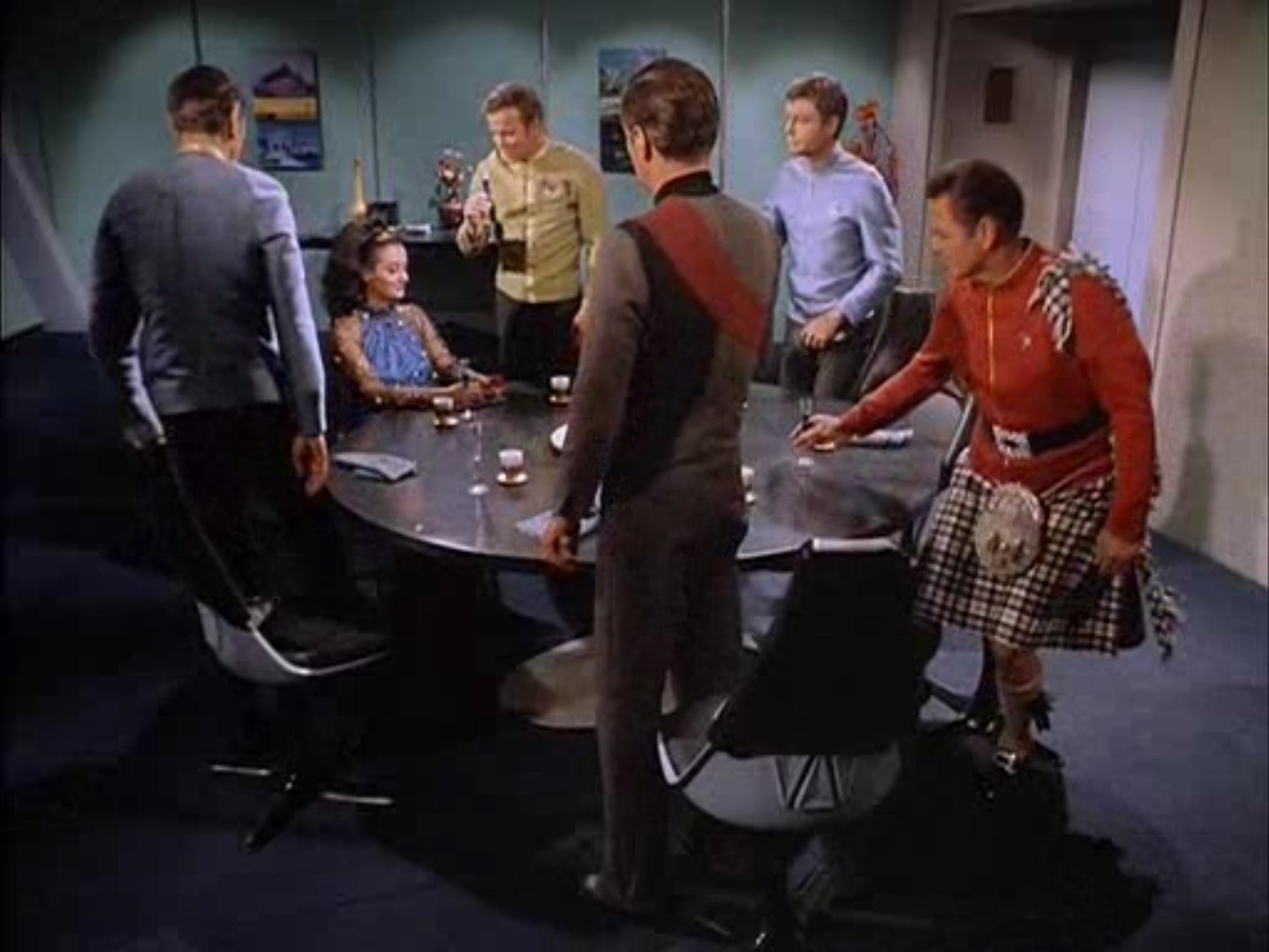
"Gentlemen, surely we can patronize Dr. Jones a little more intensely. Perhaps if we tower over her!"
The fly in this episode's ointment is another kind of emotion: one-sided love. Accompanying Jones is Lawrence Marvick, an illustrious engineer who is ostensibly there to contemplate how a Medusan might integrate into the crew of a starship. His real aim, however, is to convince Jones to abandon her mission to stay with him. To attain this goal, he is willing to resort to murder. Unfortunately for him, when he confronts Kollos, phaser in hand, all the alien has to do is open his protective box. Marvick is violently repelled by Kollos' appearance and, insane, takes control of engineering just long enough to drive the Enterprise into the barrier that surrounds the galaxy. The ship becomes lost in the zone, and none of the crew can navigate the ship out.
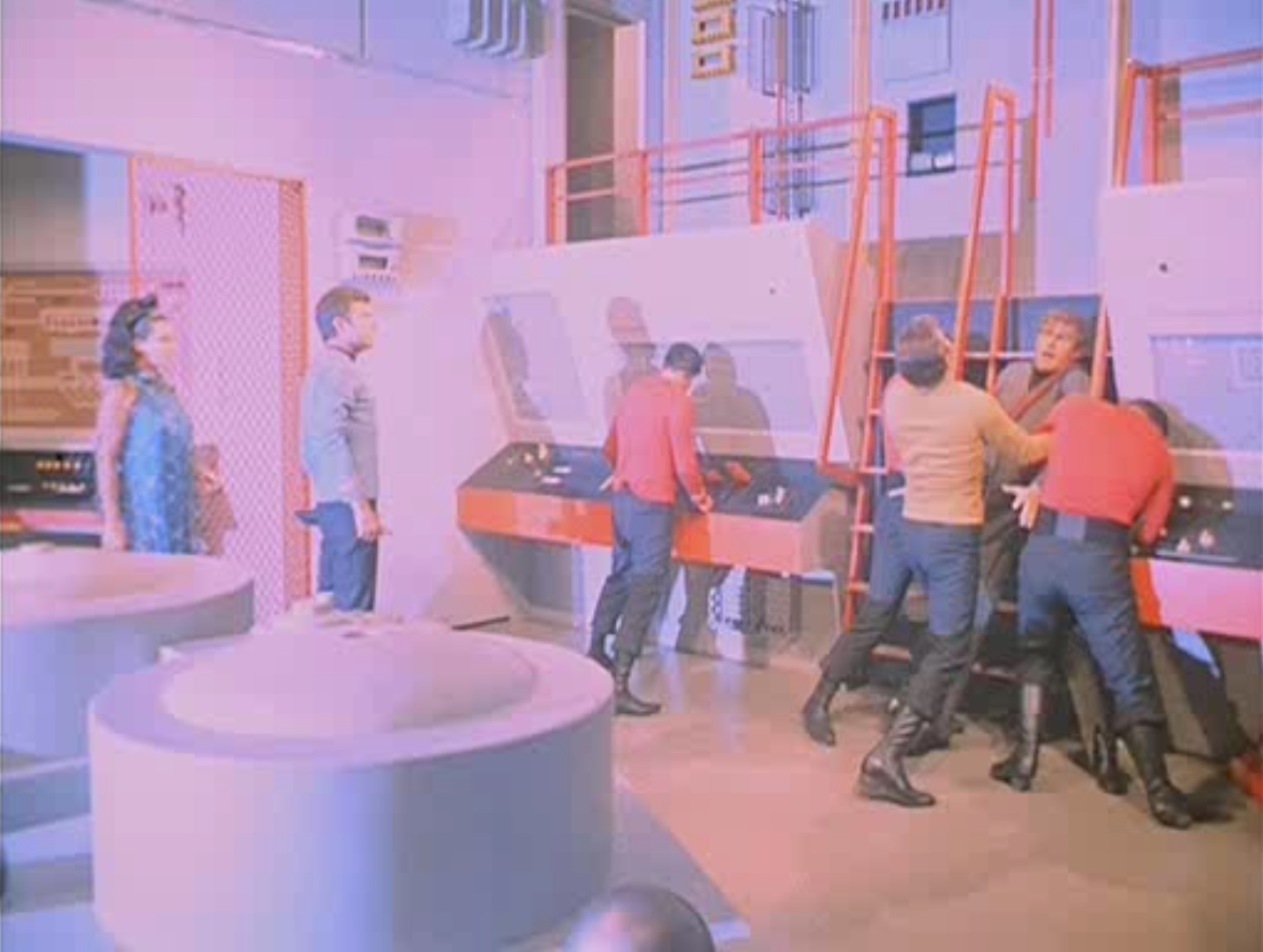
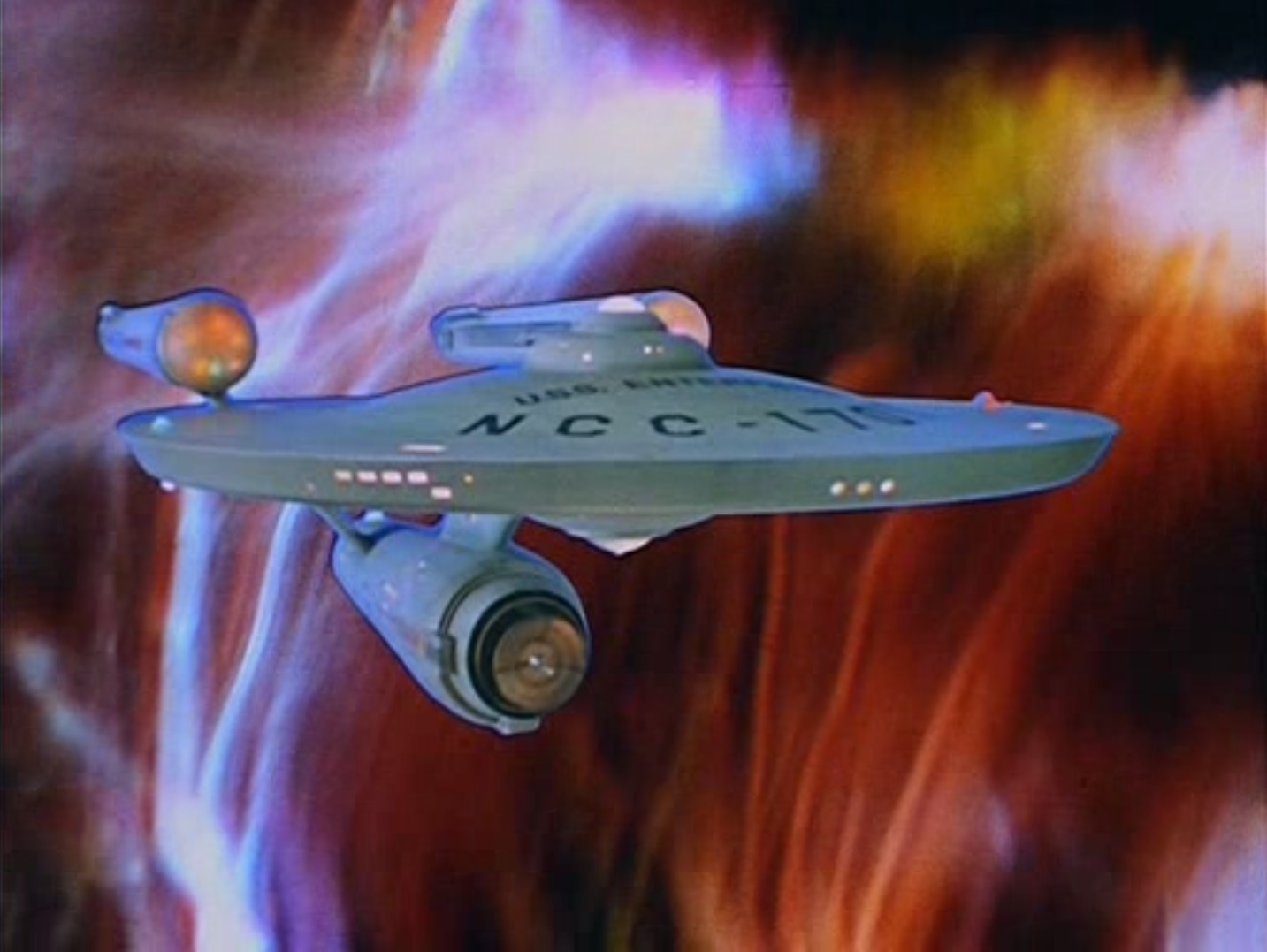
Where 430 men (and women) have gone twice before.
But Kollos can. Spock, with his telepathic abilities and his Starfleet training, volunteers to fuse minds with the Medusan, resulting in an astonishing hybrid, which successfully navigates the ship out of the zone with no difficulty. I cannot adequately express how marvelous Nimoy is in this role, subtly uniting the sober Spock with the somewhat whimsical, profound Kollos in an absolutely unique performance.
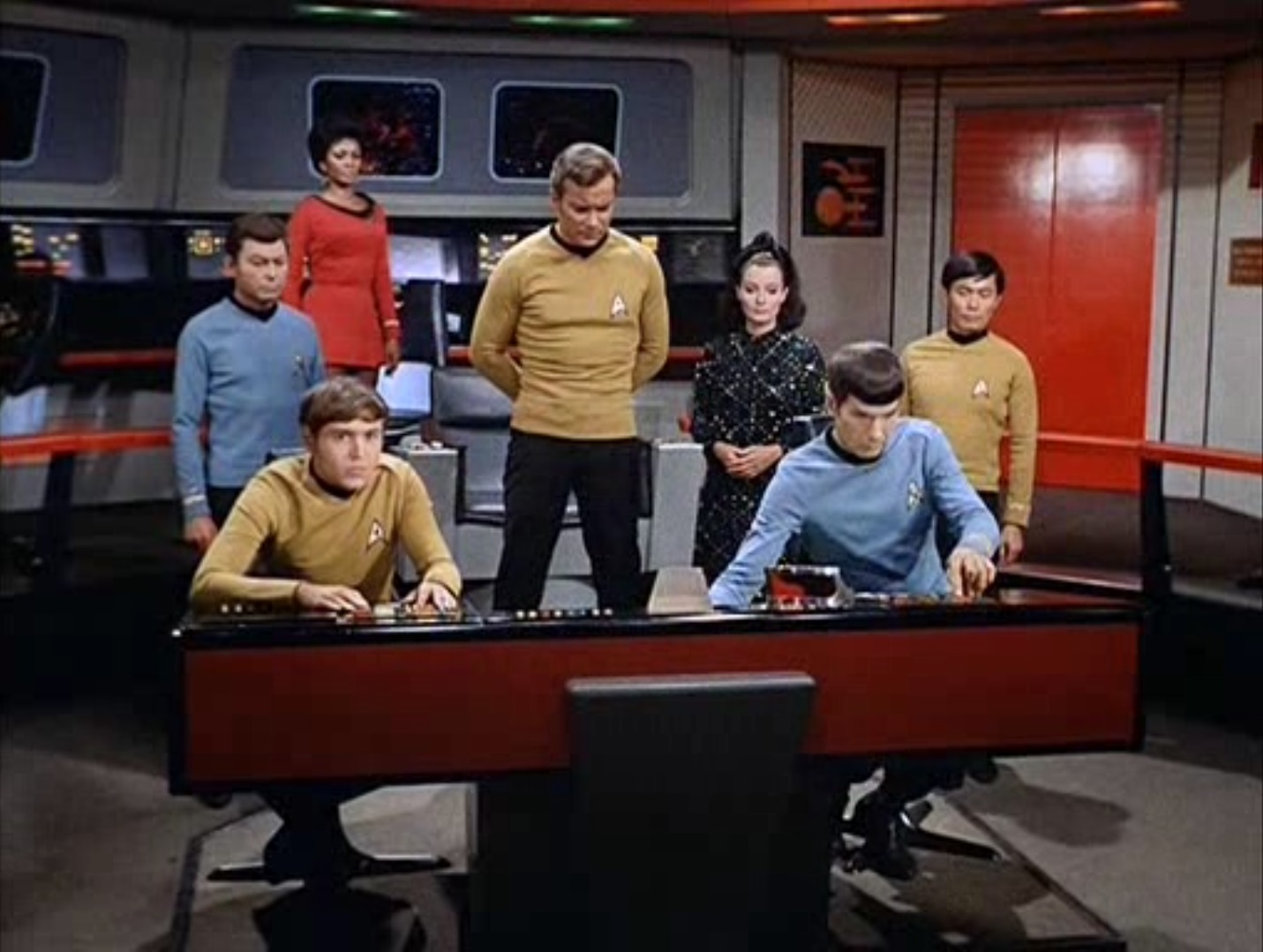
Sp/ollos makes an excellent navigator. I'd love to see a Medusan/Vulcan gestalt in a future episode!
The crew is not out of the woods, however. Upon returning Kollos to his box, Spock inadvertently catches a glimpse of the Medusan and goes insane. Only Jones and her telepathic abilities can save him—but her pettiness causes her to hesitate. It is up to Kirk, frantic with worry for his friend (indeed, seemingly more worried than he was for his ship, for once) to convince the doctor to do her utmost. In the end, what convinces her is the thought that Kollos would never forgive her if she let Spock die.
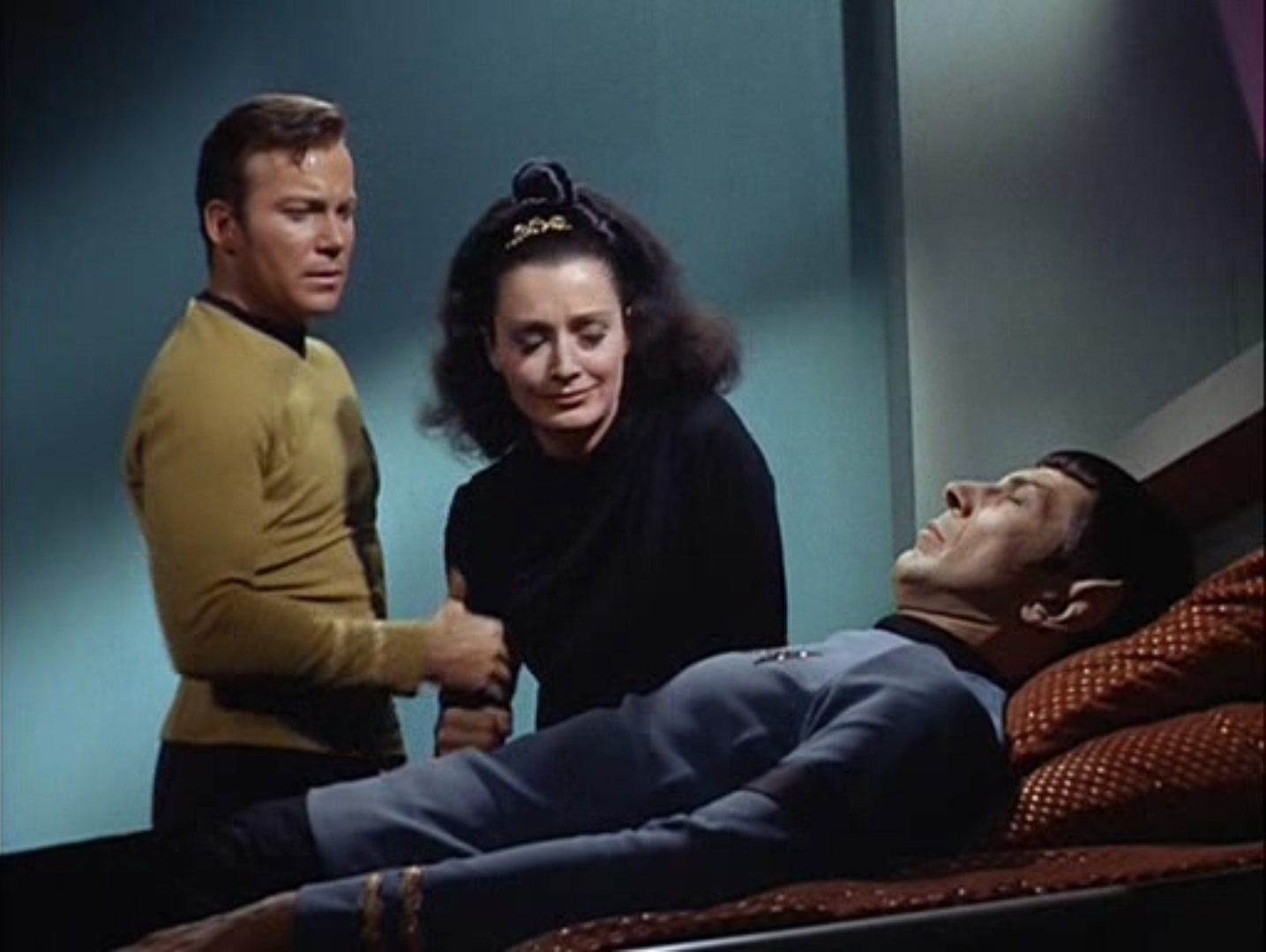
Kirk gives Dr. Jones a tough talk. To his credit, he is immediately concerned he did it wrong. (For the most part, he does…but one arrow hits the mark.)
I must express how excellent Shatner's performance is in this episode, as well. Missing are his usual, scenery-chewing tics. I have to think that the superlative jobs the cast did in this outing must be somewhat attributed to director Ralph Senensky.
Indeed, all of the "staff officers" of the show, from the cinematographer to the score master to the costume designer, work to elevate the production of "Truth". There are unusual angles, edits, and lenses to convey the disjointedness of insanity and to give a fresh feeling to the show; the score is entirely new and very evocative (though the distinctive "fight" theme is used perhaps one time too many); Dr. Jones' dress, which turns out to be a sensor web, enabling the normally sightless doctor to navigate (an excellent twist tastefully revealed), is terrific.
To be sure, the episode is not completely unexplored territory. Ugliness not equaling evil was a significant message in "The Devil in the Dark", with the monstrous Horta being a gentle, desperate mother being. The Enterprise has visited the galactic barrier twice before, in "Where No Man Has Gone Before" and "By Any Other Name". Both Spock and the ship are put in danger, two occurrences which the show-runners have made almost de riguer as plot drivers.
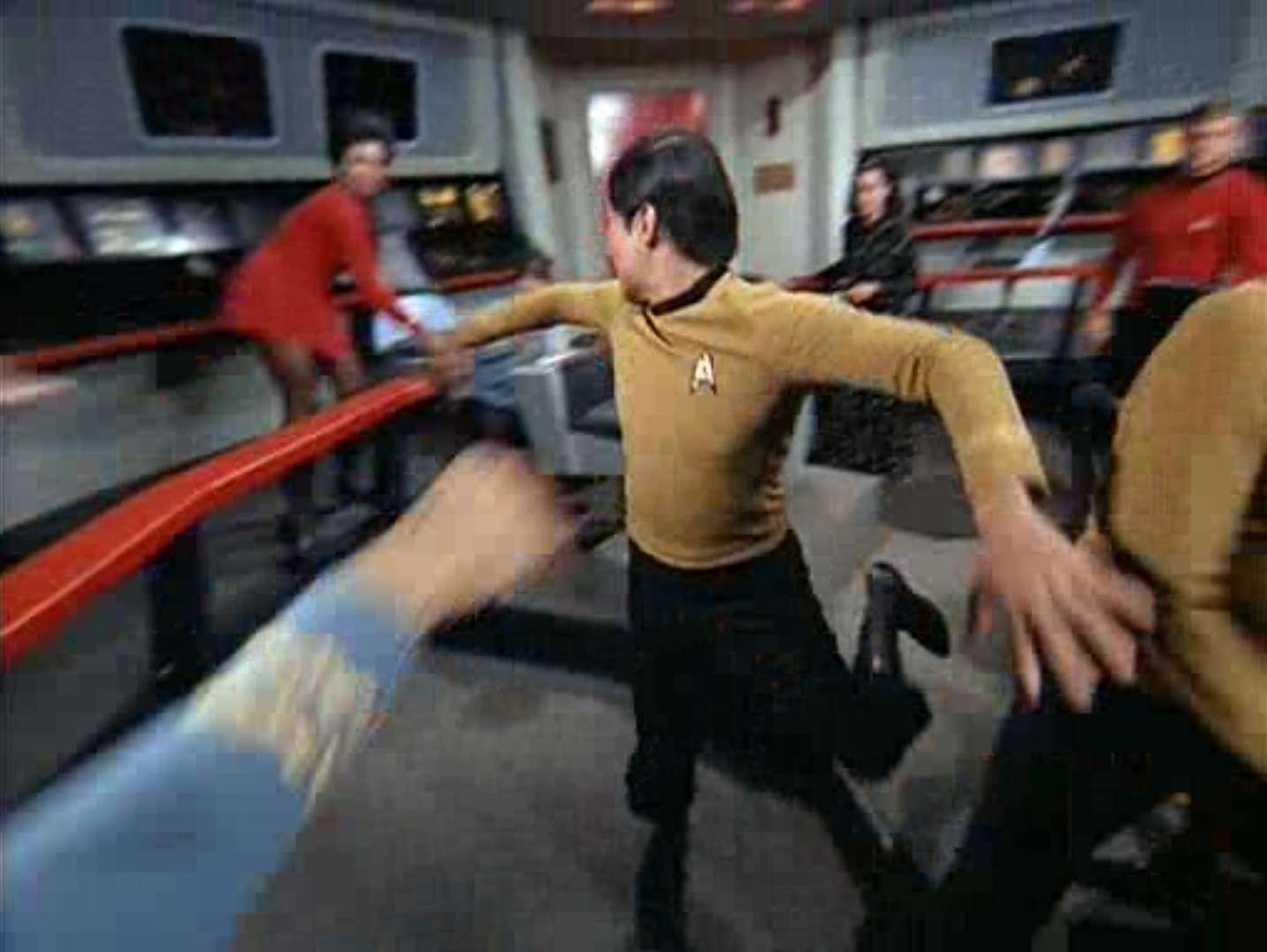
Amok Spock—don't drop acid, kids.
But it's the way it's all done that's special. Beyond the first class work turned in by the cast and crew, the writer must be credited. The pacing is unusual for Trek, with the episode's four acts of unequal length adding to the dreamy sense of madness that suffuses the episode. There is no one crisis to be resolved, but a mounting series of crises all revolving around the Spock/Miranda/Kollos relationship. In the end, the episode is not about Spock surviving or the Enterprise crew getting home safely, but about an unique woman in an unique situation navigating the fusion of not two but three alien races.
It's a rich, beautiful thing. Jean Lisoette Aroeste is a new name to me. This may well be her very first screenplay, and it is her newness that brings such a fresh cast to the show. Just as IF has made it its mission to bring new writers into the literary SF genre, it appears that the mature show of Star Trek may be providing that same vehicle for SF screenwriters (particularly women—the upcoming script, "The Empath" is also by a TV novice, the friend of a fanzine-writing friend).
I can't wait to see how the show develops as a result. 5 stars.
You've come a long way, baby

by Janice L. Newman
Most of the time, Star Trek gets it right. Women are frequently shown in positions of power and authority, and are given the respect such positions deserve. But even in the future, they occasionally run afoul of the undercurrent of sexism omnipresent in our own society. The dismissive attitude about Lieutenant Palamas in Who Mourns for Adonais, for example, or the exasperation shown toward Commissioner Hedford in Metamorphosis (not to mention the lack of concern for her ultimate fate), jar uncomfortably against our hopes and visions of a world where women have true equality and are allowed to pursue their dreams without facing condemnation or condescension—regardless of whether their dream is to be an engineer, a mother, or both.
The silver lining is when the women turn the sexist expectations of the male crewmembers on their heads. The treatment of Dr. Miranda Jones by the senior officers of the Enterprise (excluding Spock) borders on insulting. Dr. McCoy questions her career choice, while Captain Kirk is convinced of his own ability to divert her attention to himself, and patronizingly explains to her what she really wants.
Some of the best moments of the episode are when Dr. Jones defies the men’s expectations. Consider this exchange:
Dr. McCoy: “How can one so beautiful condemn herself to look upon ugliness the rest of her life? Will we allow it, gentlemen?”
All the men at the table: Certainly not.
Dr. Jones: How can one so full of joy and the love of life as you, Doctor, condemn yourself to look upon disease and suffering for the rest of your life? Can we allow that, gentlemen?
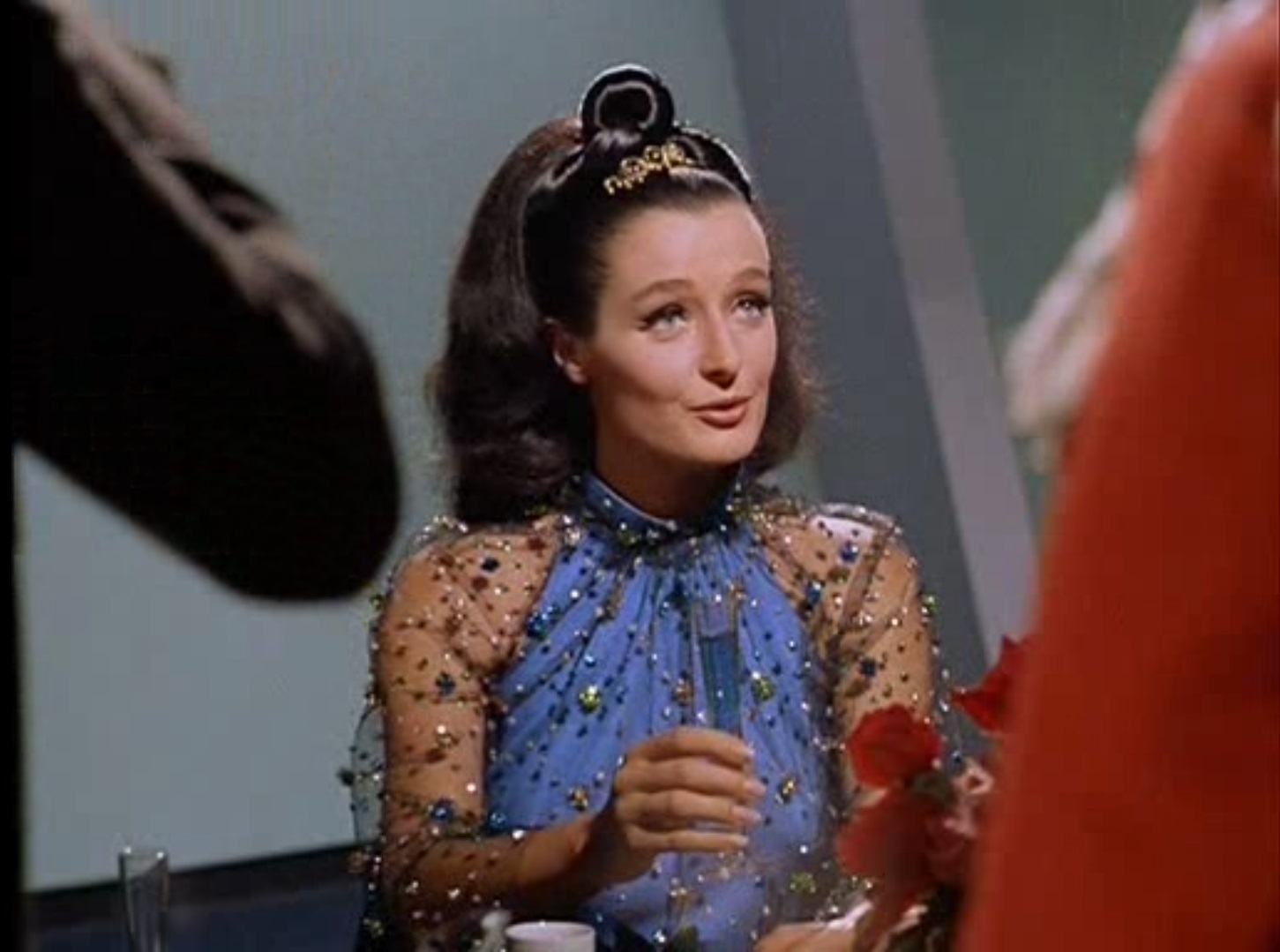
Or this one:
Captain Kirk: You're young, attractive and human. Sooner or later, no matter how beautiful their minds are, you're going to yearn for someone who looks like yourself, someone who isn't ugly.
Miranda: Ugly. What is ugly? Who is to say whether Kollos is too ugly to bear or too beautiful to bear?
Miranda’s quick witted responses, turning the men’s words back on themselves, are enormously satisfying. Her resistance to Captain Kirk’s charms is equally delightful. As much as I dislike any portrayal of sexism in the future, Miranda’s counters made it worth it. They made me wonder about the author of the episode, who she(?) is and whether she encounters such comments in her own daily life. Were the words of Dr. Jones intended to give professional women everywhere a blueprint for how to deal with such difficult situations?
Four and a half stars.
The Ambassadors

by Joe Reid
An ambassador is one that represents their country to a host country. This week in Star Trek we got to see several ambassadors of several races…and of more than one variety.
From the onset of the episode, when we were introduced to Dr. Jones, her desirability as a woman was heavily stressed. Kirk paid Jones several compliments that would lead one to think that Kirk really had a strong interest in her. These were followed by McCoy, and even Spock, who later dressed in Vulcan formal attire with the intent of honoring Dr. Jones.
All the males in this episode seemed strongly drawn to Dr. Jones, even the poor lovesick fellow who lost his life pursuing her. What was also clear was that Doctor Jones had absolutely no interest in the attention of these men in the episode. She was essentially at war with those who wanted her (perhaps a necessary battle to win status as a woman). What piqued her interest was the possibility of building a stronger connection to ambassador Kollos through a mind melding.
Her desire for Kollos was so all-encompassing that when it was revealed that Spock would have an opportunity to meld with Kollos ahead of her, she screamed out in frustration. Her rejection of the attentions of all other men throughout the episode demonstrated her desire for Kollos.
In the end, her desires were requited. Kollos did indeed have some measure of desire for her as well. We saw this as when he joined with Spock, Kollos paid special attention to her, highlighting the fact that her future and his would be intertwined going forward on his world in their near future. Although this was complicated when he also paid special attention to Uhura, Jones was able to receive confirmation of Kollos’ feeling for her when she melded with Spock in order to save his life. That connection to Kollos through Spock was all that she needed to assuage her fears and insecurity about her future with Kollos.
This successful conclusion to the story had Spock himself playing as the ambassador from the heart of Kollos to the heart of Jones, thus ending the quiet war between men and the doctor.
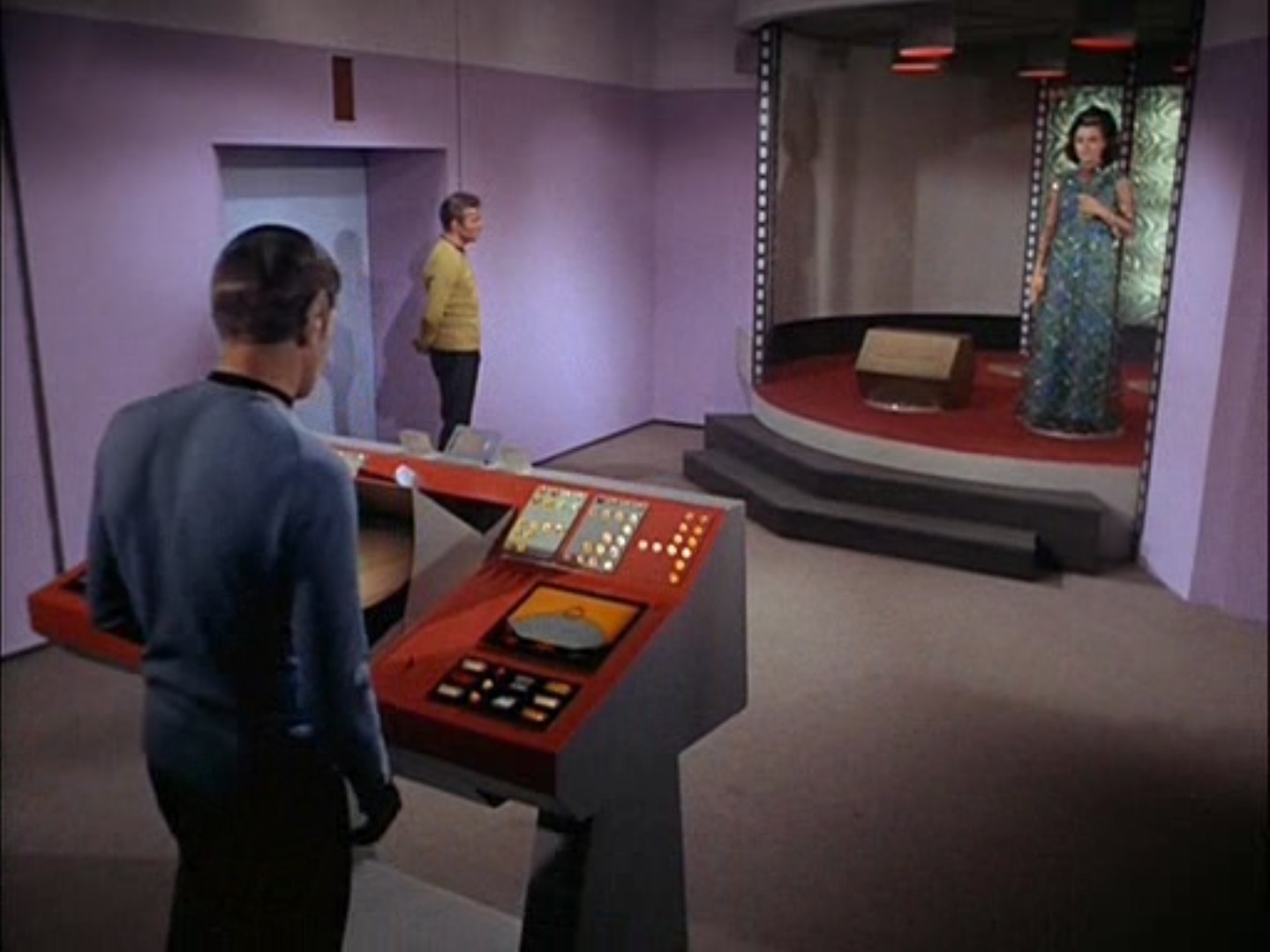
Happy endings for everyone.
It was a fantastic story with solid acting, great costumes, and three-dimensional characterizations. More of this please!
Five stars
[With Takumi Shibano the first Trans-Pacific guest of honor at a Worldcon (Baycon, this year), it is appropriate that we at long last present our first Japanese correspondent: science fiction fan and jazz enthusiast, Yo Aoyama!]

by Yo Aoyama
Hello! Yo Aoyama here: 26 and a lifelong resident of Japan. As a lover of music, novels and movies, I am honored to be able to participate in this journey from the other side of the Pacific Ocean.
When Gideon told me about his fanzine the last time he and his wife were in Japan, I knew I had to join the Journey. Japanese movies and science fiction have already been featured many times, but now you've got a home-grown correspondent to tell you the latest information about Japanese science fiction movies, novels, comics, and more!

The rice field near my home.
It is relatively recently that the genre of science fiction has been recognized in Japan, but it has been booming in recent years. "UchūJin ("Cosmic Dust")" by Takumi Shibano, mentioned in Alison's article last month, was launched in 1957, and "SF Magazine" was launched by Hayakawa Shobo in 1959. At first, "SF Magazine" mainly introduced overseas works, but since 1961, they have held contests for new writers in Japan and have been discovering many talents. In 1963, the Japanese Science Fiction Writers Club was also established, and now science fiction is becoming a major genre in Japan.
For this installment, I want to tell you about The Girl Who Leapt Through Time from the short collection of the same name released in March last year by Yasutaka Tsutsui, who was selected as an honorable mention in the second SF contest and is also active in publishing a fanzine himself.

The cover for The Girl Who Leapt Through Time.
When you think of time travel, what works come to mind? Wells' Time Machine? Or is it the hit movie Planet of the Apes that came out earlier this year? Unlike those workers, The Girl Who Leapt Through Time was initially announced as a children's literature for junior high and high school students, but adults are beginning to realize its charm, and it is a work everyone on the Journey should know about!
The star of this work is Kazuko Yoshiyama, a girl in her third year of junior high school (9th grade). One day, while cleaning the science room with two of her classmates, the scent of lavender drifting from the laboratory test tube causes her to faint. Three days later, Kazuko discovers her ability to jump through time after almost being hit by a truck, finding herself exactly 24 hours before the incident. How did she gain this power? How is it related to the scent of lavender? And if it is all the result of a suspicious experiment, who is responsible? Moreover, how does it connect to the string of mysterious events happening around her, including a terrific local earthquake. Initially confused by the ability she has suddenly gained, she is determined to solve the mystery by making full use of it.
"The Girl Who Leapt Through Time" blends many genres beyond science fiction: romance, mystery, children's literature, but the charm of this work is that deep knowledge of (and utilization of the elements in) the science fiction genre. This is largely conveyed through the character of Fukushima-sensei, Kazuo's science teacher.
Fukushima-sensei describes himself as "a person who collects and researches mysterious phenomena…not a scientist, but a researcher, just recording what happened as it is." Interestingly, when describing the phenomenon, he references a David Lang, who suddenly disappeared in front of his wife, two children and two friends, as described in the book, "Mysteries of the Supernatural", by Frank Edwards, published in Japanese by Hayakawa Publishing in 1963. Clearly Fukushima-sensei (and Leapt author Tsutsui) have a firm grounding in both contemporary science fiction and 'weird' books.

"Mysteries of the Supernatural—BUT THAT HAPPENED!"
In this way, Fukushima-sensei plays a commentary role while also moving the story along by hinting at the true nature of Kazuko's mystery. He explains the phenomenon using the terms "teleportation" and "timeleap". I have not seen the word "timeleap" elsewhere, and it is likely a sort of author-coined 'Japanglish'. Compared to the common term "time travel", it is a perfect expression for the events of this work, which mainly involve travel in short periods of time without using tools such as time machines.
"The Girl Who Leapt Through Time" is published as the 5th book in the ten-volume "Junior SF" series published by the Tsuru Shobo company, many of which I have read. These 'children's books' have a charm that is anything but childish. Science fiction is no longer just for adults. And with books like these, the boys and girls who read them will be inspired to one day create a reality that mirrors the stories they read in their youth.

by Gideon Marcus
Live from Miami Beach!

If you, like Walter Cronkite, Chet Huntley and David Brinkley (and me), soldiered through the four days and nights of GOP convention coverage, you saw the drama unfold in Miami Beach as it happened. Dick Nixon came into the event a "half-inch" shy of having the nomination sewed up, his chief competition coming from New York governor Nelson Rockefeller. California governor Ronald Reagan, best known for his Chesterfield cigarette ads, coyly denied that he was a candidate…until he suddenly was, in a desperate bid to court "the New South".

The suspense was all a bit forced. By Day Two, it was understood that the New Jersey delegation, which had been putatively firm in supporting native son Senator Clifford Case through the first ballot so as to be able to play kingmaker later on, was now breaking for Nixon. On Day Three, South Carolina Senator Strom Thurmond, who had expressed that his first and second choices were Ronald Reagan, suddenly declared his support for Nixon.
And so, after endless seconding speeches for candidates who had no intention of being President, like Governor Hatfield of Oregon and "dead duck" Governor Romney of Michigan, Nixon won on the first ballot.
After that, the only unknown was who would be his running mate. The South made loud objections to any GOP liberals being tapped, like New York mayor John Lindsay and Illinois Senator Charles Percy. The smart money was on a Southerner like John Tower of Texas or Howard Baker of Tennessee. So everyone was surprised when Maryland governor Spiro Agnew got the nod at a press conference the morning of Day 4, overwhelmingly winning the ballot that night (though not without loud protest from Romney's Michigan contingent).

Why Agnew? Here were a couple of comments from the NBC reporter pool after the convention:
"It's not that Agnew adds anything to the ticket; it's that he doesn't take anything away."
"Everybody loves Agnew–no one's ever heard of him!"
Agnew, who is kind of a Southerner, and kind of a liberal, but who has recently come out in favor of strong "law and order" (which means urging cops to shoot Baltimoreans if they steal shoes), will enable Nixon to retain his chameleon qualities while Agnew acts as attack dog. And since being the actual Vice Presidency is worth exactly one half-full bucket of warm piss, it doesn't really matter that Agnew is brand new to large scale politics.
Long story short, Nixon is the One, which we've known since February. God help us all.

Live from New York!
When Galaxy first appeared in 1950, it was also "the One", breathing fresh new air into the science fiction genre. 18 years later, it is still a regular on the ballot for the Hugo Award. Last month's was a superlative issue; does this month's mag maintain that level of quality?

cover by Jack Gaughan
Nightwings, by Robert Silverberg
Silverbob presents a richly drawn future world, one in which humanity has soared to great heights only to stumble back to savagery twice. Now, thousands of years later, Earth is in its Third Cycle. The planet is an intergalactic backwater, and its people are rigidly divided into castes.
Our heroes are a Watcher, a Flier, and a Changeling. The first, whose viewpoint we share, is an aged itinerant, hauling in a wagon his arcane tools with which he clairvoys the heavens three times a day (or is it four? The author says both.) for any signs of an alien invasion. The Flier Avluela, the only woman in the story, is a spare youth who is able to soar on dragonfly wings when the cosmic wind is not too strong. And finally, there is Gorman, who has no caste, yet has such a broad knowledge of history that he could pose as a Rememberer.

art by Jack Gaughan
All roads lead to Rome, so it is said, and indeed the three end up in history-drenched Roum, where the Watcher finds the city overcrowded with his caste. The cruel Prince of Roum, a Dominator, takes a shine to Avluela, compelling her to share his bed. This incenses Gormon, the crudely handsome mutant, who vows his revenge.
Gormon has the advantage of knowing that justice will not be long delayed–the alien invasion is coming, and he is an advance scout…
There's something hollow about this tale, rather in the vein of lesser Zelazny. Oh, it's prettily and deliberately constructed, but the story's characters are merely observers rather than actors. The stage is set and the inevitable happens. When the alien conquest occurs, it is our Watcher who sounds the alarm, but it is implied others were about to do so (why they did not cry out the night before when the invasion first became apparent is left an inadequately explained mystery). It's a story that doesn't really say or do anything.
Beyond that, I object to the lone female existing to be loved and/or raped, depending on the man involved. She is there to be a pretty companion, a object of pity, a tormented vessel. I suppose the small mercy is she is not also a harpy, as Silverberg is occasionally wont to present his women.
Anyway, I give it just three stars, but I imagine it'll be a Hugo contender next year…
When I Was Very Jung, by Brian W. Aldiss

art by Brock
A weird mix of sex, cannibalism, and archetypes. I found it distasteful and out of place.
One star.
Find the Face, by Ross Rocklynne

One of science fiction's eldest veterans offers up this romantic piece. It has the old-fashioned narrative framework, with an aged tramp freighter captain describing the day he was contracted by a wealthy widow, and what ensued afterwards. The widow's husband and family had been lost in a space accident, but somehow, his face remained, etched across the sky in cosmic clouds and star clusters. The widow saw this phenomenon once, and she was determined to find from what vantage in the universe it could be reliably observed again.
The captain, meanwhile, was looking for Cuspid, the planet whence the green horses that sired his favorite racer came. Together, they went off on their separate quests, and in the process, found the one thing neither had been looking for: new love.
It's something of a mawkish story and nothing particularly memorable. That said, it is sweet, almost like a romantic A. B. Chandler piece, and I appreciated the two characters being oldsters rather than spring chickens. Moreover, these were not ageless immortals, but silver-haired and wrinkle-faced septuagenarians.
More of that, please. Three stars.
The Listeners, by James E. Gunn

art by Dan Adkins
In the early 21st Century, Project Ozma continues, despite fifty years of drawing a blank; even with the efforts of dozens of astronomers, hundreds of staff, and the entire survey calendar of the great Arecibo telescope in Puerto Rico, not a single extraterrestrial signal has been encountered. Low morale and lack of purpose are the rule amongst these dispirited sentinels.
This is an odd story, with much discussion and development, but no resolution. At times, the author hints that a message is forthcoming, or maybe even already being received, if only the listeners could crack the code to understand it. But the climax to the tale has little to do with the story's backbone, and, as with Nightwings, the characters drift rather than do.
It feels like the beginning of a novel, not a complete story. Larry Niven could probably have done a lot more with the piece in about half the space.
Three stars.
For Your Information: Mission to a Comet, by Willy Ley

Now this piece, I dug. Willy Ley talks about why comets are important to understanding the early history of the solar system, and which ones could feasibly be approached with our current rocket and probe technology. The little chart with all the astronomical details of the Earth-approaching comets was worth the piece all by itself. I particularly liked the idea of Saturn for a "swing-around" mission to catch up with Halley's Coment from behind!
We truly live in an SFnal reality. Five stars.
The Wonders We Owe DeGaulle, by Lise Braun

art by Brock
Newcomer Lise Braun offers up a droll travel guide to a mauled Earth. It seems a French bomb that exploded in Algeria sundered our planet's crust, sinking half the Americas and turning the Sahara into a stained glass plain.
It's mildly diverting but Braun's clumsy writing shows her clearly a novice. I think the setting would have served better as background than a nonfact piece.
Two stars.
A Specter is Haunting Texas (Part 3 of 3), by Fritz Leiber

art by Jack Gaughan
Lastly, the conclusion to Leiber's latest serial, a sort of fairytale version of a hard science epic. The "Specter" is really a spaceman named de la Cruz, a gaunt, eight-foot figure kept erect by an electric exoskeleton, denizen of a circumlunar colony. He has been the centerpiece of a Mexican revolution, which is trying to throw off the literal yokes (cybernetic and hypnotic) forced upon the Mesoamerican race by post-Apocalyptic Texans. The spaceman's comrades include two quite capable and comely freedom fighters, Raquel Vaquel, daughter of the governor of Texas province, and Rosa ("La Cucaracha"), a high-spirited Chicana; then there's Guchu, a Black Buddhist, reluctantly working with the ofays; Dr. Fanninowicz, a Teutonic technician with fascist sympathies; Father Francisco; and El Toro, a charismatic leader in the revolution.
In this installment, de la Cruz finally makes it to Yellow Knife, where he wishes to lay claim to a valuable pitchblende (uranium) deposit. Unfortunately, the Texans have gotten there first–and what they have established on the site finally reveals just what all those purple-illumined towers they've been planting across the North American continent are for. 'T'ain't nothin' good, I can assure you!
Last month, I read a fanzine where someone complained that this was a perfectly good story ruined by being turned into a tongue-in-cheek fable. Certainly, I felt the same way for a while. By Part II, however, I was fully onboard. While this last bit didn't thrill me quite as much as the middle installment, it's still a worthy novel overall. When it comes out in paperback, pick it up.
Four stars for this section and for the serial as a whole.

art by Jack Gaughan
Roll Call
Like the Republican convention, the outcome seemed certain, but a few twists and turns along the way did create a bit of doubt. But in the end, if this month's Galaxy is perhaps not all the magazine we hoped it would be, nevertheless, it's one we can live with.
For the time being, Galaxy remains The One. May it continue to be so for four more years.